

19 Direct and Indirect Speech Rules Examples (Updated 2025)
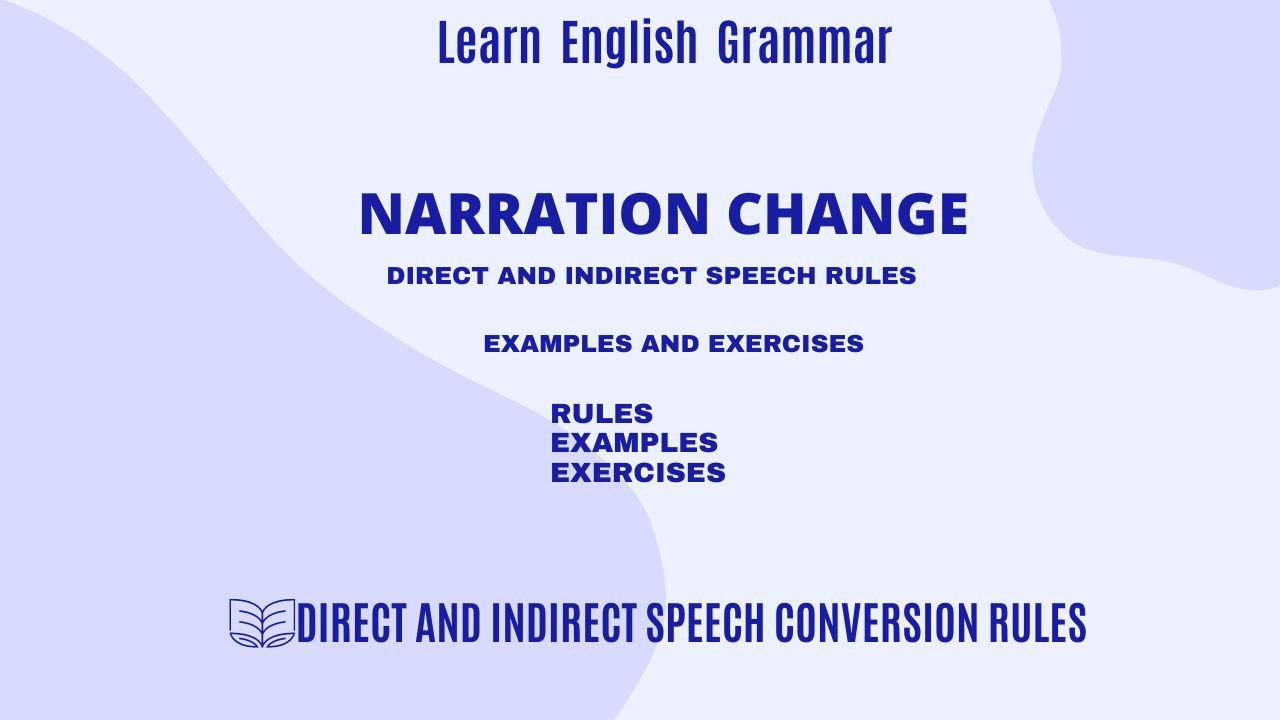
Have you ever struggled with the rules of direct and indirect speech? You’re not alone. These forms of speech can be challenging, but mastering them is crucial for clear and effective communication, especially for school students, ESL learners, and those preparing for competitive exams.
Understanding direct and indirect speech conversion rules is crucial for clear and accurate communication and the conversion between direct and indirect speech will significantly enhance your language skills.
This informative article will explore these Direct and Indirect Speech Rules for Conversion with detailed examples.
Understanding Direct Speech
Direct speech is a form of reporting that presents someone’s exact words without any alterations. It is commonly enclosed in quotation marks, allowing readers to see the speaker’s statements precisely as they were uttered.
1. Key Elements of Direct Speech
a . Quotation Marks
Quotation marks are your best friends here. They compress the exact words spoken by a person.
b. Punctuation Placement
Punctuation is crucial. Commas , periods , question marks , and exclamation points all have their specific places within the quotation marks.
c. Speaker Tags
Speaker tags like “he said” or “she exclaimed” are often used to indicate who is speaking. These can be placed before , after , or even in the middle of the quoted speech.
2. E xamples of Direct Speech
a. Basic Examples
Consider this simple example:
- Ritu said, “I am going to the store.”
Here, the exact words of Ritu are presented within quotation marks.
b. Complex Examples
Now, let’s add more complexity:
- “I can’t believe it,” she whispered, “but I saw a unicorn in the garden.”
Notice how the sentence is split into two parts, but both are still within quotation marks.
For a better understanding of Direct Narration
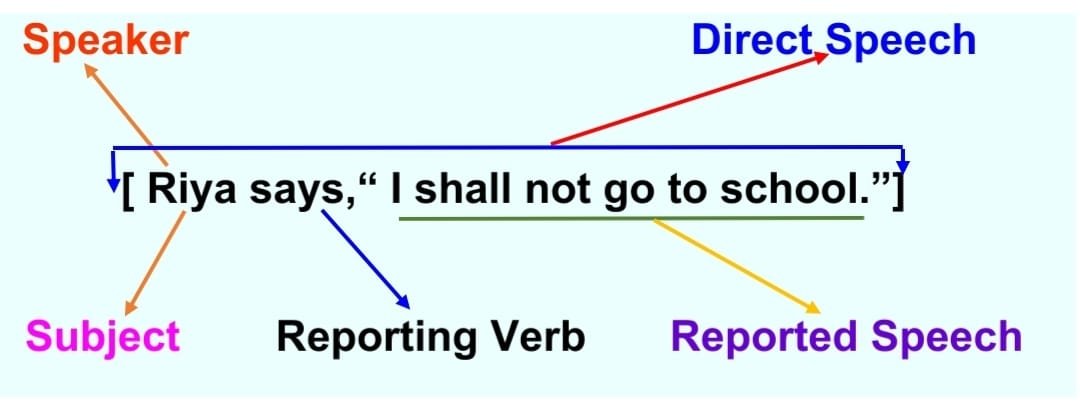
“I shall not go to school,” are the exact words of Riya, enclosed in quotation marks/inverted commas (“….”). This format, which uses commas and quotation marks/inverted commas, is called direct speech . In this sentence, ‘Riya’ is the subject or speaker, ‘says’ is the reporting verb, and ‘I shall not go to school’ is the reported speech.
Understanding Indirect Speech
Indirect speech , on the other hand, involves paraphrasing someone’s words and reporting them indirectly, without using quotation marks. It requires a few changes in structure, such as tense and pronoun shifts. Let’s convert the previous example of direct speech into indirect speech:
1. Key Elements of Indirect Speech
a. Removing Quotation Marks
Unlike direct speech, indirect speech doesn’t require quotation marks. You’re paraphrasing what was said.
b. Changing Pronouns
Pronouns often need to be changed to fit the new context. For instance, “I” becomes “he” or “she.”
c. Adjusting Tenses
Tenses usually shift back when converting to indirect speech. Present tense often turns into past tense.
d. Modifying Time Expressions
Time expressions like “today” or “tomorrow” also change to maintain the timeline consistency.
2. Examples of Indirect Speech
Basic Examples
Here’s a simple conversion:
- Direct: John said, “I am going to the store.”
- Indirect: John said that he was going to the store.
Complex Examples
For a more complex sentence:
- Direct: “I can’t believe it,” she whispered, “but I saw a unicorn in the garden.”
- Indirect: She whispered that she couldn’t believe it but that she had seen a unicorn in the garden.
For a clear concept of Indirect Narration
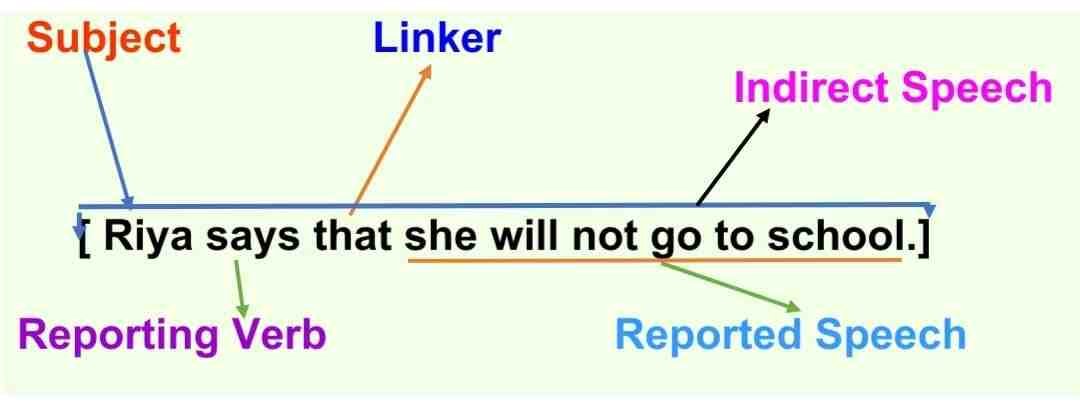
Similarly, we can report the above sentence without quoting Riya’s exact words while keeping the meaning the same. This format is called indirect speech. In this format, no commas or quotation marks/inverted commas are used; only a full stop (.) is used at the end of the sentence.
Difference between direct and indirect speech rules
The following comparison highlights the key differences between direct and indirect speech rules, including punctuation, tense changes, and adjustments to pronouns and time references.
People also ask
Direct and Indirect Speech Rules: Essential for Learners
Discover the essential rules of direct and indirect speech with a variety of examples to improve your language skills. Effortlessly understand the intricacies of converting statements, questions, and commands from one form to another.
Understanding direct and indirect speech is crucial for effective communication, for learners. Here, we have outlined the essential rules you need to know.
A. Reporting Verbs Rules B. Tenses Rules C. Pronouns Rules D. Punctuation Marks Rules E. Modals and Conditional Rules F. Modifying Words Rules
A. Direct and Indirect Speech Rules for Reporting Verbs
Different reporting verbs are used to introduce indirect speech. The choice of reporting verb can convey the speaker’s attitude towards the reported speech.
Changes in reporting verbs according to tense are one of the most important rules for converting direct speech into indirect speech.
Remember: If the reporting verbs are in the present or future tense, the tense of the verb in the reported speech is not changed .
Remember: If the reporting verbs are in the past tense , the tense of the verb in the reported speech will be in the corresponding past tense.
Here are some commonly used reporting verbs:
Rule 1: Reporting verbs rules for ‘ Say ‘ and ‘ Tell ‘.
“Say” and “tell” are two frequently used reporting verbs. “Say” is generally followed by the reported speech, while “tell” is followed by the indirect object (the person being addressed).
Direct: He says , “I am your friend.” Indirect: He says that he is your friend.
Direct: He said to me, “I’m going to the store.” Indirect: She told me that he was going to the store.
Reporting verbs ‘Say’ and ‘Tell’ Chart
Rule 2: ‘ ask ‘ and ‘ inquire’ are used as reporting verbs..
When reporting questions , “ ask “ and “ inquire “ are commonly employed reporting verbs.
Direct: He said to me, “Where are you going?” Indirect: He asked where I was going.
Direct: She said , “When will the concert start?” Indirect: She inquired, “When will the concert start?”
Direct: Sarah said , “What time does the movie start?” Indirect: Sarah asked what time the movie started.
Direct: “Could you please provide more details?” she said to me. Indirect: She inquired politely if I could provide more details.
Direct: The customer said , “Do you have this item in stock?” Indirect: The customer i nquired if that item had in stock.
Rule 3: Reporting Verb rules for “ Request “, “ Advise “, “ Order “, and “ Beg “.
To report imperative sentences, “Request”, “Advise”, “Order”, and “beg” are often used.
Direct: “Please close the door,” she said . Indirect: She requested that the door be closed.
Direct: “You should study regularly,” he said. Indirect: He advised that regular studying should be done.
Direct: “Stand up straight,” the sergeant said . Indirect: The sergeant ordered that they stand up straight.
Direct: He said to me, “Go home at once” Indirect: He ordered me to go home at once.
Direct: She said , “Do not run in the sun” Indirect: She advised not to run in the sun.”
Direct: “Please forgive me,” she said. Indirect: She begged for forgiveness.
B. Tenses Rules for Direct and Indirect Speech
The second most important rule is the changes of Tenses for converting direct speech to indirect speech. When transforming direct speech into indirect speech, there are specific rules to follow regarding tense changes:
Rule 4: If the reporting verb is in the present tense ,
If the Reporting Verb is in the Present Tense , there is no change in the tense in the Reported Verb when Direct Speech is converted into Indirect Narration.
Direct: Arnab says , “The room is dark.” Indirect: Arnab says that the room is dark.
Direct: Arnab says , “The room was dark.” Indirect: Arnab says that the room was dark.
Direct: Arnab says , “I shall finish the work.” Indirect: Arnab says that he will finish the work.
Direct: Mary says , “I am going to the party.” Indirect: Mary says that she is going to the party.
Direct: He tells us, “I will finish the project by tomorrow.” Indirect: He tells us that he will finish the project by tomorrow.
Rule 5: If the reporting verb is in the future tense ,
If the Reporting Verb is in the Future Tense , there is no change in the tense in the Reported Verb when Direct Speech is converted into Indirect Narration.
Direct: Sarah will say , “I am going to the store.” Indirect: Sarah will say that she is going to the store.
Direct: John will say, “I have completed the assignment.” Indirect: John will say that he has completed the assignment.
Direct: Arnab will say, “The room is dark.” Indirect: Arnab will say that the room is dark.
Direct: Arnab will say , “The room was dark.” Indirect: Arnab will say that the room was dark.
Direct: Arnab will say, “I shall finish the work.” Indirect: Arnab will say that he will finish the work.
Rule 6: If the reporting verb is in the past tense ,
If the Reporting verb of the Direct Narration is in the Past Tense , the Present Tense of the Verb in the Reported Speech of Direct Narration is changed into the corresponding Past Tense in Indirect Narration .
Direct: Rohan said , “She works hard.” Indirect: Rohan said that she worked hard.
Direct: Rohan said, “She is singing a song.” Indirect: Rohan said that she was singing a song.
Direct: The guest said shouting, “We have arrived .” Indirect: The guest shouted that they had arrived.
Direct: My sister said , “It has been raining hard for 3 days”. Indirect: My sister said that it had been raining hard for 3 days.
Direct: Father said, “I visited the Taj yesterday.” Indirect: Father said that he had visited the Taj the previous day.
Direct: The boys said, “They were traveling in the park.” Indirect: The boys said that they had been traveling in the park.
Direct: The reporters commented , “The Kohinoor had been lost long ago”. Indirect: The reporters commented that the Kohinoor had been lost long ago.
Direct: Jyotsna said, “ She had been doing the work for 3 hours”. Indirect: Jyotsna said that she had been doing the work for 3 hours.
Rule: 7 If the reported speech implies Universal Truth or Habitual Fact or Scientific Truth ,
The Tense of the Verb remains unchanged in Indirect Narration in cases of General Statements of Facts , Universal Truths , Commonplace Occurrences , and Habitual or Repeated Actions . No real change occurs in these cases. Only there will be present Tense alone.
Direct: The boy said to his mother, “ The sun rises in the East”. Indirect: The boy told his mother that the sun rises in the East. [ Universal Truth ]
Direct: The monk answered , “ Man is mortal”. Indirect: The monk answered that man is mortal. [ Universal Truth ]
Direct: The teacher told the students, “ Perseverance always leads to success.” Indirect: The teacher told the students that perseverance always leads to success.
3. Direct and Indirect Speech R ules for Pronouns
There are certain rules to follow regarding the changes of pronouns from direct speech to indirect speech:
Rule 8: Personal Pronouns (I, We, You, He, She, They) Rules
First person.
(a) If the subject of the reported speech of direct form is in the first person, the subject of the reported speech will be replaced by the subject of the reporting verb in indirect form, but the number must be the same. [ singular > singular and plural > plural ]
Direct: She says, “ I am ill today.” Indirect: She says that she is ill that day.
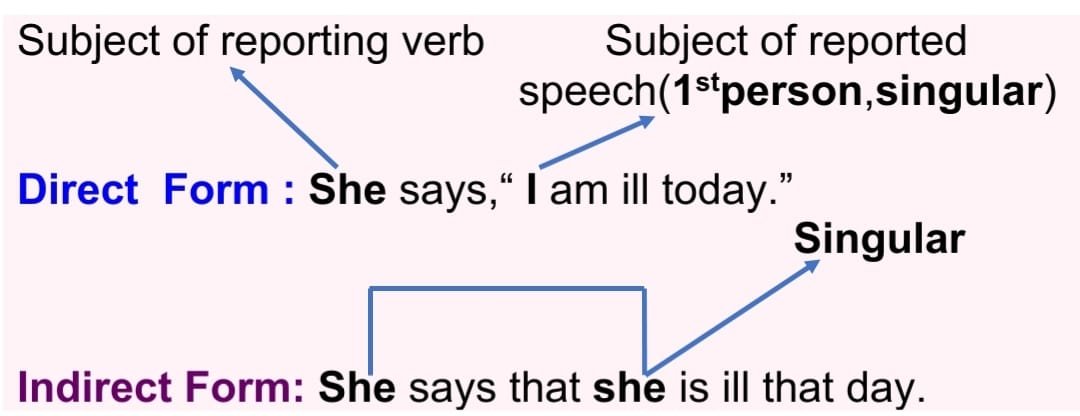
Second Person
(b) If the subject of the reported speech in the Direct Form is in the second person, the subject of the reported speech will be replaced by the object of the reporting verb in the indirect form, but the number must be the same. [ singular > singular and plural > plural ]
Direct: He says to me , ” You can do this work.” Indirect: He tells me that I can do that work.
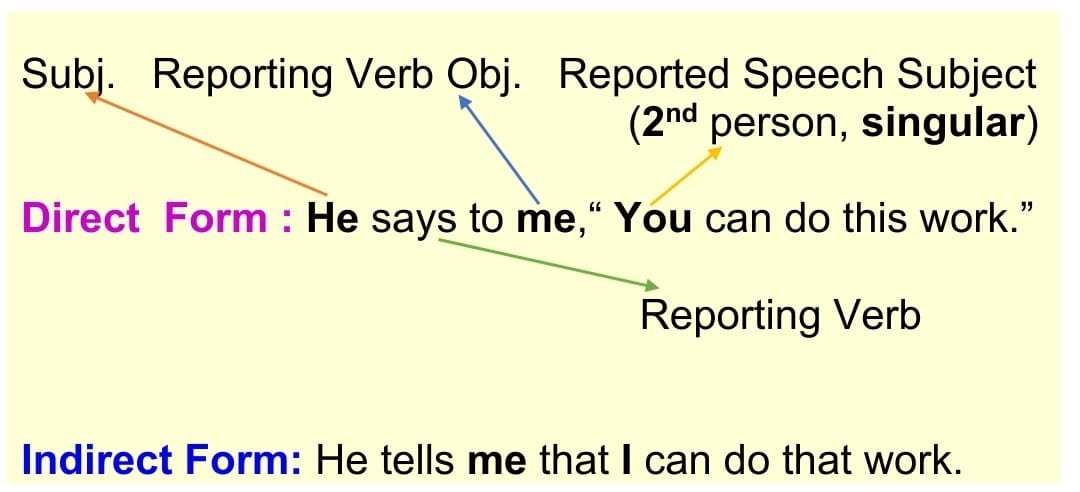
Third Person
(c) If the subject of the reported speech of Direct Form is in the third person, there will be no change in the person of the Indirect Form.
Direct: I said, “ He will not wait for his friend.” Indirect: I said that he would not wait for his friend.
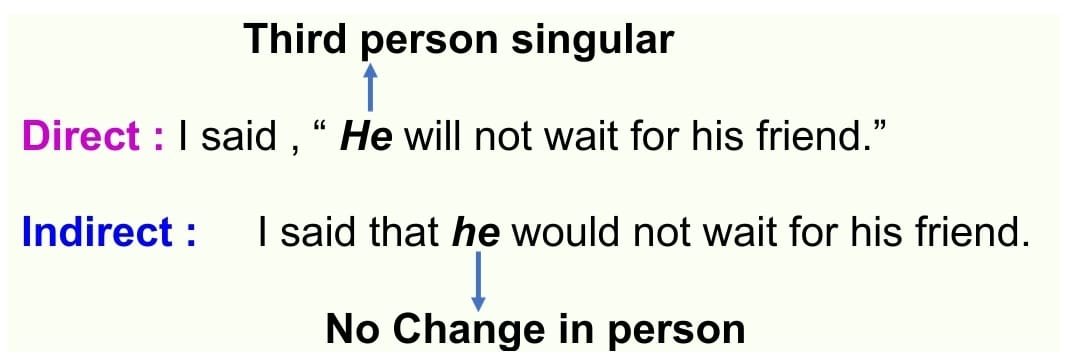
Pronouns Chart : direct and indirect speech rules
Rule 9: demonstrative pronouns ( this, that ) rules.
In the case of demonstrative pronouns, replace them with appropriate pronouns in indirect speech.
Direct: “ This is my book,” she said. Indirect: She said that this was her book.
4. Direct and Indirect Speech ( Punctuation and Quotation Marks ) Rules
Understanding how to punctuate and use quotation marks correctly is crucial when dealing with direct and indirect speech. Here are some guidelines:
Rule 10: Comma with Reporting Verb Rules
When introducing indirect speech with a reporting verb, use a comma to separate the reporting verb from the reported speech.
Example: She said, “I’ll be there on time.”
Rule 11: Question Mark to Full Stop Rules
If the direct speech is a question, change the question mark to a full stop when converting to indirect speech.
Direct: He asked, “Are you coming to the party?” Indirect: He asked if I was coming to the party.
Rule 12: Exclamation Mark to Full Stop Rules
In cases where the direct speech has an exclamation mark, replace it with a full stop in indirect speech.
Direct: She exclaimed, “What a beautiful day!” Indirect: She exclaimed that it was a beautiful day.
E. Direct to Indirect Speech Conversion Rules : Modals and Conditional Sentences
Indirect speech involving modals and conditional sentences requires careful attention to maintain accuracy:
Rule 13: Rules of Modals in Indirect Speech
When dealing with modals like can, could, will, would, may, might, shall, should, must, etc., use the appropriate past form in indirect speech.
Direct: She said, “You should respect your elders. Indirect: She said that I should respect my elders.
Direct: She said, “I can speak French fluently. Indirect: She said that she could speak French fluently.
Direct: May I borrow your pen?” she asked. Indirect: She asked if she might borrow my pen.
Direct: He said, “You must complete the assignment by tomorrow. Indirect: He said that I must complete the assignment by the next day.
Rule 14: Conditional Sentences in Indirect Speech Rules
In indirect speech, conditional sentences undergo specific changes, especially when they involve “will” or “would.”
Direct: He said, “I will help you.” Indirect: He said that he would help me.
Direct: He said, “I will help you with your project Indirect: He said that he would help me with my project.
F. Direct and Indirect Speech Rules: ( Modifying Words – Time, Place, Manner )
Adding modifying words or phrases can alter the meaning of the reported speech:
Rule 15: Reporting with Adverbs of Time
When using adverbs of time in indirect speech, adjust them to match the new timeframe.
Direct: “I will come tomorrow,” she said. Indirect: She said that she would come the next day.
Rule 16: Reporting with Adverbs of Place
Similar to adverbs of time, adverbs of place need modification in indirect speech.
Direct: ” I live here,” he said. Indirect: He said that he lived there.
Rule 17: Reporting with Adverbs of Manner
We can also use Adverbs of manner in indirect speech, requiring appropriate adjustments.
Direct: “He ran quickly,” she said. Indirect: She said that he ran quickly.
Time, Place, Manner, Distance, Direction Chart: Direct and Indirect Speech Rules
In Indirect Narration, words denoting Time, Place, Manner, Distance, and Direction used in the quoted speech are correspondingly changed to conform to the point of view of the Reporter. Thus, the sense of nearness is changed into that of Distance, and so on.
Place Chart
Manner chart, distance chart, direction chart, direct and indirect speech advanced rules.
It is necessary to know about the Direct Indirect Speech Advanced Rules to change the mode of narration from direct to indirect speech of different sentences. All five sentences of Direct Indirect Speech Conversion Rules are shown with proper examples below.
A. Assertive Sentence Conversion Rules
To convert Assertive sentences into indirect speech the following rules are applied.
(a) No comma and Inverted comma in Indirect Speech, only full stop at the end. (b) Reporting Verbs changed from Direct Speech to Indirect Speech ; ‘say – say’, ‘says – says’, ‘said – said’, ‘said to – told’, ‘say to – tell’, ‘says to – tells’. (c) Connective ‘that’ added before Reported Speech in indirect Narration.
Direct: He said to me, “I am ill.” Indirect: He told me that he was ill.
Direct: Mary said, “I am happy with my results.” Indirect: Mary said that she was happy with her results.
Direct: Tom said, “I will attend the meeting tomorrow.” Indirect: Tom said that he would attend the meeting the next day.
Direct: Alice said, “I have finished my homework.” Indirect: Alice said that she had finished her homework.
Direct: David said, “We are planning a trip to the mountains.” Indirect: David said that they were planning a trip to the mountains.
B. Interrogative sentences Conversion rules
Forming indirect speech with questions necessitates some adjustments:
a. Reporting Yes/No Questions rules
When reporting yes/no questions, use “if” or “whether” and invert the subject and auxiliary verb in indirect speech.
Direct: John asked, “Are you coming to the party?” Indirect: John asked if I was coming to the party.
Direct: Sarah asked, “Do you like chocolate?” Indirect: Sarah asked if I liked chocolate.
Direct: Mike asked, “Have you finished your project?” Indirect: Mike asked if I had finished my project.
Direct: Emma asked, “Will you help me with my homework?” Indirect: Emma asked if I would help her with her homework.
Direct: “Will you be there?” he asked. Indirect: He asked if I would be there.
b. Reporting Wh-Questions rules
For reporting wh-questions, maintain the question word and adjust the word order in indirect speech.
(a) ‘Tell’ and ‘say’ in Direct Narration are changed to ‘ask’, ‘enquire of’, ‘question’, ‘want to know’ etc. in Indirect Narration. (b) In place of introductory ‘that’. ‘if’ or ‘whether’ should be used. (c) In Indirect Narration a full stop (.) must be put in place of a question mark(?) at the end of the sentence. (d) In Direct Narration the Reported Speech begins with W-word or how, in Indirect Narration the same Wh-word or how is retained.
Direct: Lisa asked, “Where are you going?” Indirect: Lisa asked where I was going.
Direct: Mark asked, “What time does the movie start?” Indirect: Mark asked what time the movie started.
Direct: Jennifer asked, “Why did you leave early?” Indirect: Jennifer asked why I had left early.
Direct: Tom asked, “How do you solve this problem?” Indirect: Tom asked how I solved that problem.
Direct: “Where are you going?” she asked. Indirect: She asked where I was going.
Direct: The teacher said to me, “Why are you late?” Indirect: The teacher asked me why I was late.
C. Imperative Sentences Conversion rules
The indirect speech also involves reporting imperatives, which are commands, requests, or advice:
Reporting Commands
When reporting commands, use the reporting verb “tell” and change the imperative verb to the corresponding infinitive.
Direct: The teacher said, “Open your books.” Indirect: The teacher told the students to open their books.
Reporting Requests
For reporting requests, employ the reporting verb “ask” and convert the imperative verb to the corresponding infinitive.
Direct: She said, “Please help me with this.” Indirect: She asked for help with that.
(a) Reporting verbs of Direct Speech changed into order or command, advise, or request according to sense in Indirect Speech. (b) ‘To’ is placed before Reported speech in Indirect Narration; for the negative imperative sentence ‘not to’ is used. (c) ‘not to’ can also be replaced by ‘forbid’, or ‘prohibit’. (d) ‘Let’ implies ‘suggestion’ or ‘proposal’; Reporting verb will be ‘suggest’ or ‘propose’ in Indirect Speech. ‘that’ is used before Reported speech in Indirect Narration (e) ‘Let’ without ‘suggestion’ or ‘proposal’; Reporting verb will be ‘tell’, or ‘wish’ according to sense in Indirect Speech. ‘that’ is used before Reported speech in Indirect Narration.
Direct: Mother said to me, “Don’t run in the sun.” Indirect: Mother advised me not to run in the sun.
Direct: She said to me, “Let us go for a picnic.” Indirect: She suggested that we should go for a picnic.
D. Optative Sentence Conversion rules
The following rules are used to change an optative sentence from direct speech to indirect speech
(a) Reporting verbs changed to ‘ wish ’, ‘ pray’ , and ‘ bless ’ in Indirect Speech. (b) Linker, ‘ that ’ is placed before Reported speech in Indirect Narration.
Direct: The monk said to me, “ May God bless you.” Indirect: The monk wished that God might bless me.
E. Exclamatory Sentences Conversion rules
(a) The reporting verb is changed into exclaim (in joy), exclaim (in grief), cried out (in sorrow), pray, wish, etc. (b) Examinations are turned into statements. (c) Interjections (Alas, Oh, Hurrah) are omitted. (d) ‘What’, and ‘How’ used in exclamation should be replaced by great, great, very, very much, and big.
Direct: The boys said, “Hurrah! we have won the match.” Indirect: The boy exclaimed in joy that they had won the match.
Solved Exercises Direct and Indirect Speech
Change the following sentences into indirect speech.
Q: Ratan said to Anita, “I don’t like your brother”.
Ans: Ratan told Anita that she did not like her brother.
Q: The hermit said to the boys, “God is present everywhere.”
Ans: The hermit told the boys that God is present everywhere.
Q: :He said to you, “You shouldn’t play in my garden.”
Ans: He told you that you should not play in his garden.
Q: The class teacher said to the students. “The inspector will visit our school today.”
Ans: The class teacher told the students that the inspector would visit their school that day.
Q: He said to me, “I don’t believe you.”
Ans: He told me that he didn’t believe me.
Q: She said to her son, “I’ve often told you not to play with fire.”
Ans: She told her son that she had often told him not to play with fire.
Q: Sitesh said to Lina, “I want you to go to Patna with me.”
Ans: Sitesh told Lina that he wanted her to go to Patna with him.
Q: “We can’t be quite happy in life,” he said.
Ans: He said that they couldn’t be quite happy in life.
Q: He said, “The Muslims bury their dead.”
He said that the Muslims bury their dead.
Q: “You’ve overcooked the steak again, Mary”, he said.
Ans: He told Mary that she had overcooked the steak again.
Q: Ramen said to Bina, “I’m going to your house this, week.”
Ans: Ramen told Bina that he was going to her house that week.
Q: He said, “We will discuss this tomorrow.”
Ans: He said that they would discuss that the next day
Turn the following sentences into direct speech.
Q: He said to me, “You are wicked; so I shall not mix with you.”
Ans: He told me that I was wicked; so he would not mix with me.
Q: He said to you, “I was much struck by your eloquence.”
Ans: He told you that he had been much struck by your eloquence.
Q: We remarked, “God is gracious.”
Ans: We remarked that God is gracious.
Q: I said to my mother, “I shall always obey you.”
Ans: I told my mother that I should always obey her.
Q: He said to Gopal, “You were a mere boy when I saw you last.”
Ans: He told Gopal that he was a mere boy when he had seen him last.
Q: I said to him, “The sky is blue.”
Ans: I told him that the sky is blue.
Q: He said to me, “You will feel the consequences.”
Ans: He told me that I should feel the consequences.
Q: She said to you, “I am not angry with you.”
Ans: She told you that she was not angry with you.
Q: I said to them, “You have done wrong.”
Ans: I told them that they had done wrong.
Q: He said, “I visit the temple every day.”
Ans: He said that he visited the temple every day.
Direct and Indirect Speech Sample MCQ Questions Answers
Fill in the blanks with proper direct and indirect speech rules.
- d) had been
- Answer: a) was
- c) will like
- d) had liked
- Answer: a) liked
- a) will visit
- b) would visit
- d) had visited
- Answer: b) would visit
- Answer: c) was
- c) will have
- Answer: b) had
- Answer: b) could
- a) revolves
- c) revolved
- d) is revolving
- Answer: a) revolves
- b) had been
- Answer: b) had been
- Answer: b) would
FAQs : Direct and Indirect Speech Rules
Q : what is the key difference between direct and indirect speech.
Ans: The main difference lies in the quoting style. Direct speech involves repeating someone’s exact words, while indirect speech reports what was said without quoting verbatim.
FAQ 2: Is it always necessary to backshift the tense in indirect speech?
Ans: While backshifting is common, some exceptions exist, especially in cases where the statement’s truth remains constant.
FAQ 3: How do I handle multiple speakers in indirect speech?
Ans: When reporting multiple speakers, use appropriate reporting verbs and introduce each person’s dialogue in a logical sequence.
FAQ 4: Can I mix direct and indirect speech in the same sentence?
Ans: Combining direct and indirect speech in a sentence is possible, but it requires precision to avoid confusion.
FAQ 5: What are some reporting verbs commonly used in indirect speech?
Ans: Reporting verbs like “said,” “told,” “asked,” “claimed,” and “explained” are frequently employed.
FAQ 6: How can I ensure my writing maintains a natural flow when switching between direct and indirect speech?
Ans: Focus on maintaining consistency in style and verb tense to ensure a smooth transition between direct and indirect speech.
FAQ 7: How do I identify direct and indirect speech in a sentence?
Ans: Direct speech is usually enclosed within quotation marks and directly quotes someone’s words. Indirect speech, on the other hand, reports those words without quotation marks, often using reporting verbs like “said,” “told,” “asked,” etc.
FAQ 8: Can reporting verbs change the meaning of indirect speech?
Ans: Yes, the choice of reporting verbs can convey the speaker’s attitude or emotions towards the reported speech. Different reporting verbs can modify the meaning slightly.
FAQ 9: What are the common reporting verbs for indirect speech?
Ans: Common reporting verbs for indirect speech include “say,” “tell,” “ask,” “inquire,” “explain,” “describe,” and more.
FAQ 10: How do I change tenses in indirect speech?
Ans: The tense in indirect speech is generally shifted back one step. For example, present simple becomes past simple, present continuous becomes past continuous, and so on.
FAQ 11: Is it essential to use quotation marks in indirect speech?
Ans: No, quotation marks are not used in indirect speech as they report the speech without directly quoting it.
FAQ 12: Can you give an example of indirect speech in narratives?
Ans: Certainly! In the story, he said, “I love you,” to which she replied that she loved him too.
FAQ 14: Can we omit the reporting verb in indirect speech?
Ans: It is possible to omit the reporting verb in some cases, especially in informal contexts, but including it adds clarity and structure to the reported speech.
FAQ 15: Do all tenses change in indirect speech?
Ans: Most tenses change in indirect speech, but the changes depend on the context and the tense of the original statement.
FAQ 16: Can you provide more examples of direct and indirect speech transformations?
Ans: Certainly! Here are a few more examples:
Direct: “I am reading a book,” she said. Indirect: She said that she was reading a book.
Direct: “We have completed the project,” they exclaimed. Indirect: They exclaimed that they had completed the project.
FAQ 17: How can I practice using direct and indirect speech effectively?
Ans: Practice by converting direct speech to indirect speech and vice versa using various reporting verbs, tenses, and pronouns. Additionally, read books or articles and identify the reported speech used by the authors.
Related Posts:
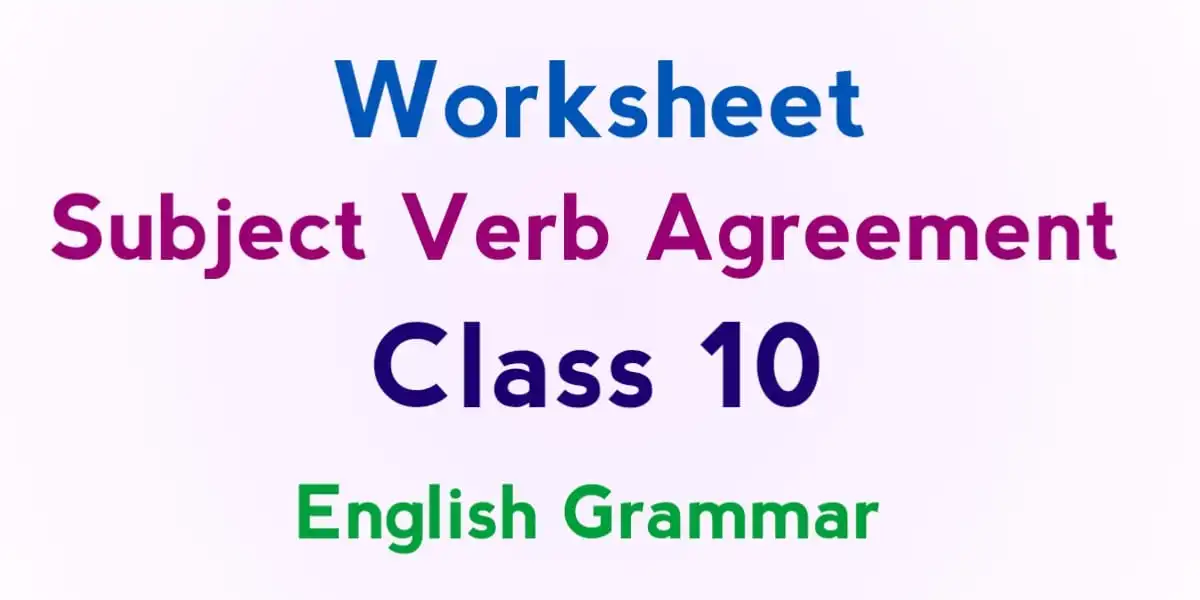
Direct and Indirect Speech: Useful Rules and Examples
Are you having trouble understanding the difference between direct and indirect speech? Direct speech is when you quote someone’s exact words, while indirect speech is when you report what someone said without using their exact words. This can be a tricky concept to grasp, but with a little practice, you’ll be able to use both forms of speech with ease.

Direct and Indirect Speech
When someone speaks, we can report what they said in two ways: direct speech and indirect speech. Direct speech is when we quote the exact words that were spoken, while indirect speech is when we report what was said without using the speaker’s exact words. Here’s an example:
Direct speech: “I love pizza,” said John. Indirect speech: John said that he loved pizza.
Using direct speech can make your writing more engaging and can help to convey the speaker’s tone and emotion. However, indirect speech can be useful when you want to summarize what someone said or when you don’t have the exact words that were spoken.
To change direct speech to indirect speech, you need to follow some rules. Firstly, you need to change the tense of the verb in the reported speech to match the tense of the reporting verb. Secondly, you need to change the pronouns and adverbs in the reported speech to match the new speaker. Here’s an example:
Direct speech: “I will go to the park,” said Sarah. Indirect speech: Sarah said that she would go to the park.
It’s important to note that when you use indirect speech, you need to use reporting verbs such as “said,” “told,” or “asked” to indicate who is speaking. Here’s an example:
Direct speech: “What time is it?” asked Tom. Indirect speech: Tom asked what time it was.
In summary, understanding direct and indirect speech is crucial for effective communication and writing. Direct speech can be used to convey the speaker’s tone and emotion, while indirect speech can be useful when summarizing what someone said. By following the rules for changing direct speech to indirect speech, you can accurately report what was said while maintaining clarity and readability in your writing.
Differences between Direct and Indirect Speech
When it comes to reporting speech, there are two ways to go about it: direct and indirect speech. Direct speech is when you report someone’s exact words, while indirect speech is when you report what someone said without using their exact words. Here are some of the key differences between direct and indirect speech:
Change of Pronouns
In direct speech, the pronouns used are those of the original speaker. However, in indirect speech, the pronouns have to be changed to reflect the perspective of the reporter. For example:
- Direct speech: “I am going to the store,” said John.
- Indirect speech: John said he was going to the store.
In the above example, the pronoun “I” changes to “he” in indirect speech.
Change of Tenses
Another major difference between direct and indirect speech is the change of tenses. In direct speech, the verb tense used is the same as that used by the original speaker. However, in indirect speech, the verb tense may change depending on the context. For example:
- Direct speech: “I am studying for my exams,” said Sarah.
- Indirect speech: Sarah said she was studying for her exams.
In the above example, the present continuous tense “am studying” changes to the past continuous tense “was studying” in indirect speech.
Change of Time and Place References
When reporting indirect speech, the time and place references may also change. For example:
- Direct speech: “I will meet you at the park tomorrow,” said Tom.
- Indirect speech: Tom said he would meet you at the park the next day.
In the above example, “tomorrow” changes to “the next day” in indirect speech.
Overall, it is important to understand the differences between direct and indirect speech to report speech accurately and effectively. By following the rules of direct and indirect speech, you can convey the intended message of the original speaker.
Converting Direct Speech Into Indirect Speech
When you need to report what someone said in your own words, you can use indirect speech. To convert direct speech into indirect speech, you need to follow a few rules.
Step 1: Remove the Quotation Marks
The first step is to remove the quotation marks that enclose the relayed text. This is because indirect speech does not use the exact words of the speaker.
Step 2: Use a Reporting Verb and a Linker
To indicate that you are reporting what someone said, you need to use a reporting verb such as “said,” “asked,” “told,” or “exclaimed.” You also need to use a linker such as “that” or “whether” to connect the reporting verb to the reported speech.
For example:
- Direct speech: “I love ice cream,” said Mary.
- Indirect speech: Mary said that she loved ice cream.
Step 3: Change the Tense of the Verb
When you use indirect speech, you need to change the tense of the verb in the reported speech to match the tense of the reporting verb.
- Indirect speech: John said that he was going to the store.
Step 4: Change the Pronouns
You also need to change the pronouns in the reported speech to match the subject of the reporting verb.
- Direct speech: “Are you busy now?” Tina asked me.
- Indirect speech: Tina asked whether I was busy then.
By following these rules, you can convert direct speech into indirect speech and report what someone said in your own words.
Converting Indirect Speech Into Direct Speech
Converting indirect speech into direct speech involves changing the reported speech to its original form as spoken by the speaker. Here are the steps to follow when converting indirect speech into direct speech:
- Identify the reporting verb: The first step is to identify the reporting verb used in the indirect speech. This will help you determine the tense of the direct speech.
- Change the pronouns: The next step is to change the pronouns in the indirect speech to match the person speaking in the direct speech. For example, if the indirect speech is “She said that she was going to the store,” the direct speech would be “I am going to the store,” if you are the person speaking.
- Change the tense: Change the tense of the verbs in the indirect speech to match the tense of the direct speech. For example, if the indirect speech is “He said that he would visit tomorrow,” the direct speech would be “He says he will visit tomorrow.”
- Remove the reporting verb and conjunction: In direct speech, there is no need for a reporting verb or conjunction. Simply remove them from the indirect speech to get the direct speech.
Here is an example to illustrate the process:
Indirect Speech: John said that he was tired and wanted to go home.
Direct Speech: “I am tired and want to go home,” John said.
By following these steps, you can easily convert indirect speech into direct speech.
Examples of Direct and Indirect Speech
Direct and indirect speech are two ways to report what someone has said. Direct speech reports the exact words spoken by a person, while indirect speech reports the meaning of what was said. Here are some examples of both types of speech:
Direct Speech Examples
Direct speech is used when you want to report the exact words spoken by someone. It is usually enclosed in quotation marks and is often used in dialogue.
- “I am going to the store,” said Sarah.
- “It’s a beautiful day,” exclaimed John.
- “Please turn off the lights,” Mom told me.
- “I will meet you at the library,” said Tom.
- “We are going to the beach tomorrow,” announced Mary.
Indirect Speech Examples
Indirect speech, also known as reported speech, is used to report what someone said without using their exact words. It is often used in news reports, academic writing, and in situations where you want to paraphrase what someone said.
Here are some examples of indirect speech:
- Sarah said that she was going to the store.
- John exclaimed that it was a beautiful day.
- Mom told me to turn off the lights.
- Tom said that he would meet me at the library.
- Mary announced that they were going to the beach tomorrow.
In indirect speech, the verb tense may change to reflect the time of the reported speech. For example, “I am going to the store” becomes “Sarah said that she was going to the store.” Additionally, the pronouns and possessive adjectives may also change to reflect the speaker and the person being spoken about.
Overall, both direct and indirect speech are important tools for reporting what someone has said. By using these techniques, you can accurately convey the meaning of what was said while also adding your own interpretation and analysis.
Frequently Asked Questions
What is direct and indirect speech?
Direct and indirect speech refer to the ways in which we communicate what someone has said. Direct speech involves repeating the exact words spoken, using quotation marks to indicate that you are quoting someone. Indirect speech, on the other hand, involves reporting what someone has said without using their exact words.
How do you convert direct speech to indirect speech?
To convert direct speech to indirect speech, you need to change the tense of the verbs, pronouns, and time expressions. You also need to introduce a reporting verb, such as “said,” “told,” or “asked.” For example, “I love ice cream,” said Mary (direct speech) can be converted to “Mary said that she loved ice cream” (indirect speech).
What is the difference between direct speech and indirect speech?
The main difference between direct speech and indirect speech is that direct speech uses the exact words spoken, while indirect speech reports what someone has said without using their exact words. Direct speech is usually enclosed in quotation marks, while indirect speech is not.
What are some examples of direct and indirect speech?
Some examples of direct speech include “I am going to the store,” said John and “I love pizza,” exclaimed Sarah. Some examples of indirect speech include John said that he was going to the store and Sarah exclaimed that she loved pizza .
What are the rules for converting direct speech to indirect speech?
The rules for converting direct speech to indirect speech include changing the tense of the verbs, pronouns, and time expressions. You also need to introduce a reporting verb and use appropriate reporting verbs such as “said,” “told,” or “asked.”
What is a summary of direct and indirect speech?
Direct and indirect speech are two ways of reporting what someone has said. Direct speech involves repeating the exact words spoken, while indirect speech reports what someone has said without using their exact words. To convert direct speech to indirect speech, you need to change the tense of the verbs, pronouns, and time expressions and introduce a reporting verb.
You might also like:
- List of Adjectives
- Predicate Adjective
- Superlative Adjectives
Related Posts:

This website is AMNAZING
MY NAAMEE IS KISHU AND I WANTED TO TELL THERE ARE NO EXERCISES AVAILLABLEE BY YOUR WEBSITE PLEASE ADD THEM SSOON FOR OUR STUDENTS CONVIENCE IM A EIGHT GRADER LOVED YOUR EXPLABATIO
sure cries l miss my friend

- school Campus Bookshelves
- menu_book Bookshelves
- perm_media Learning Objects
- login Login
- how_to_reg Request Instructor Account
- hub Instructor Commons
Margin Size
- Download Page (PDF)
- Download Full Book (PDF)
- Periodic Table
- Physics Constants
- Scientific Calculator
- Reference & Cite
- Tools expand_more
- Readability
selected template will load here
This action is not available.

10.3: Indirect speech acts
- Last updated
- Save as PDF
- Page ID 138677

- Paul Kroeger
- Dallas International University via Language Library Press
\( \newcommand{\vecs}[1]{\overset { \scriptstyle \rightharpoonup} {\mathbf{#1}} } \)
\( \newcommand{\vecd}[1]{\overset{-\!-\!\rightharpoonup}{\vphantom{a}\smash {#1}}} \)
\( \newcommand{\id}{\mathrm{id}}\) \( \newcommand{\Span}{\mathrm{span}}\)
( \newcommand{\kernel}{\mathrm{null}\,}\) \( \newcommand{\range}{\mathrm{range}\,}\)
\( \newcommand{\RealPart}{\mathrm{Re}}\) \( \newcommand{\ImaginaryPart}{\mathrm{Im}}\)
\( \newcommand{\Argument}{\mathrm{Arg}}\) \( \newcommand{\norm}[1]{\| #1 \|}\)
\( \newcommand{\inner}[2]{\langle #1, #2 \rangle}\)
\( \newcommand{\Span}{\mathrm{span}}\)
\( \newcommand{\id}{\mathrm{id}}\)
\( \newcommand{\kernel}{\mathrm{null}\,}\)
\( \newcommand{\range}{\mathrm{range}\,}\)
\( \newcommand{\RealPart}{\mathrm{Re}}\)
\( \newcommand{\ImaginaryPart}{\mathrm{Im}}\)
\( \newcommand{\Argument}{\mathrm{Arg}}\)
\( \newcommand{\norm}[1]{\| #1 \|}\)
\( \newcommand{\Span}{\mathrm{span}}\) \( \newcommand{\AA}{\unicode[.8,0]{x212B}}\)
\( \newcommand{\vectorA}[1]{\vec{#1}} % arrow\)
\( \newcommand{\vectorAt}[1]{\vec{\text{#1}}} % arrow\)
\( \newcommand{\vectorB}[1]{\overset { \scriptstyle \rightharpoonup} {\mathbf{#1}} } \)
\( \newcommand{\vectorC}[1]{\textbf{#1}} \)
\( \newcommand{\vectorD}[1]{\overrightarrow{#1}} \)
\( \newcommand{\vectorDt}[1]{\overrightarrow{\text{#1}}} \)
\( \newcommand{\vectE}[1]{\overset{-\!-\!\rightharpoonup}{\vphantom{a}\smash{\mathbf {#1}}}} \)
The Nigerian professor Ozidi Bariki describes a conversation in which he said to a friend:
“I love your left hand.” (The friend had a cup of tea in his hand). The friend, in reaction to my utterance, transferred the cup to his right hand. That prompted me to say: “I love your right hand”. My friend smiled, recognized my desire for tea and told his sister, “My friend wants tea”… My friend’s utterance addressed to his sister in reaction to mine was a representative, i.e. a simple statement: “my friend wants a tea”. The girl rightly interpreted the context of the representative to mean a directive. In other words, her brother (my friend) was ordering her to prepare some tea. (Bariki 2008)
This brief dialogue contains two examples of indirect speech acts. In both cases, the utterance has the form of a simple statement, but is actually intended to perform a different kind of act: request in the first case and command in the second. The second statement, “My friend wants tea,” was immediately and automatically interpreted correctly by the addressee. (In African culture, when an older brother makes such a statement to his younger sister, there is only one possible interpretation.) The first statement, however, failed to communicate. Only after the second attempt was the addressee able to work out the intended meaning, not automatically at all, but as if he was trying to solve a riddle.
Bariki uses this example to illustrate the role that context plays in enabling the hearer to identify the intended speech act. But it also shows us that context alone is not enough. In the context of the first utterance, there was a natural association between what was said ( your left hand ) and what was intended (a cup of tea); the addressee was holding a cup of tea in his left hand. In spite of this, the addressee was unable to figure out what the speaker meant. The contrast between this failed attempt at communication and the immediately understood statement My friend wants tea , suggests that there are certain principles and conventions which need to be followed in order to make the illocutionary force of an utterance clear to the hearer.
We might define an indirect speech act (following Searle 1975) as an utterance in which one illocutionary act (the primary act) is intentionally performed by means of the performance of another act (the literal act). In other words, it is an utterance whose form does not reflect the intended illocutionary force. My friend wants tea is a simple declarative sentence, the form which is normally used for making statements. In the context above, however, it was correctly interpreted as a command. So the literal act was a statement, but the primary act was a command.
Most if not all languages have grammatical and/or phonological means of distinguishing at least three basic types of sentences: statements, questions, and commands. The default expectation is that declarative sentences will express statements, interrogative sentences will express questions, and imperative sentences will express commands. When these expectations are met, we have a direct speech act because the grammatical form matches the intended illocutionary force. Explicit performatives are also direct speech acts.
An indirect speech act will normally be expressed as a declarative, interrogative, or imperative sentence; so the literal act will normally be a statement, question, or command. One of the best-known types of indirect speech act is the Rhetorical Question, which involves an interrogative sentence but is not intended to be a genuine request for information.
Why is the statement I love your left hand not likely to work as an indirect request for tea? Searle (1969; 1975) proposes that in order for an indirect speech act to be successful, the literal act should normally be related to the Felicity Conditions of the intended or primary act in certain specific ways. Searle restated Austin’s Felicity Conditions under four headings: preparatory conditions(background circumstances and knowledge about the speaker, hearer, and/ or situation which must be true in order for the speech act to be felicitous); sincerity conditions (necessary psychological states of speaker and/or hearer); propositional content (the kind of situation or event described by the underlying proposition); essential condition (the essence of the speech act; what the act “counts as”). These four categories are illustrated in Table 10.1 using the speech acts of promising and requesting.
Generally speaking, speakers perform an indirect speech act by stating or asking about one of the Felicity Conditions (apart from the essential condition). The examples in (7) show some sentences that could be used as indirect requests for tea. Sentences (7a–b) ask about the preparatory condition for a request, namely the hearer’s ability to perform the action. Sentences (7c–d) state the sincerity condition for a request, namely that the speaker wants the hearer to perform the action. Sentences (7e–f) ask about the propositional content of the request, namely the future act by the hearer.
(7) a. Do you have any tea?
b. Could you possibly give me some tea?
c. I would like you to give me some tea.
d. I would really appreciate a cup of tea.
e. Will you give me some tea?
f. Are you going to give me some tea?
All of these sentences could be understood as requests for tea, if spoken in the right context, but they are clearly not all equivalent: (7b) is a more polite way of asking than (7a); (7d) is a polite request, whereas (7c) sounds more demanding; (7e) is a polite request, whereas (7f) sounds impatient and even rude.
Not every possible strategy is actually available for a given speech act. For example, asking about the sincerity condition for a request is generally quite unnatural: # Do I want you to give me some tea ? This is because speakers do not normally ask other people about their own mental or emotional states. So that specific strategy cannot be used to form an indirect request.
We almost automatically interpret examples like (7b) and (7e) as requests. This tendency is so strong that it may be hard to recognize them as indirect speech acts. The crucial point is that their grammatical form is that of a question, not a request. However, some very close paraphrases of these sentences, such as those in (8), would probably not be understood as requests in most contexts.
(8) a. Do you currently have the ability to provide me with tea?
b. Do you anticipate giving me a cup of tea in the near future?
We can see the difference quite clearly if we try to add the word please to each sentence. As we noted in Chapter 1, please is a marker of politeness which is restricted to occurring only in requests; it does not occur naturally in other kinds of speech acts. It is possible, and in most cases fairly natural, to add please to any of the sentences in (7), even to those which do not sound very polite on their own. However, this is not possible for the sentences in (8). This difference provides good evidence for saying that the sentences in (8) are not naturally interpretable as indirect requests.
(9) a. Could you possibly give me some tea, please?
b. Will you give me some tea, please?
c. I would like you to give me some tea, please.
d. Are you going to give me some tea (?please)?
e. Do you currently have the ability to provide me with tea (#please)?
f. Do you anticipate giving me a cup of tea in the near future (#please)?
The contrast between the acceptability of (7b) and (7e) as requests vs. the unacceptability of their close paraphrases in (8) suggests that the form of the sentence, as well as its semantic content, helps to determine whether an indirect speech act will be successful or not. We will return to this issue below, but first we need to think about a more fundamental question: How does the hearer recognize an indirect speech act? In other words, how does he know that the primary (intended) illocutionary force of the utterance is not the same as the literal force suggested by the form of the sentence?
Searle suggests that the key to solving this problem comes from Grice’s Cooperative Principle. If someone asks the person sitting next to him at a dinner Can you pass me the salt?, we might expect the addressee to be puzzled. Only under the most unusual circumstances would this question be relevant to the current topic of conversation. Only under the most unusual circumstances would the answer to this question be informative, since few people who can sit up at a dinner table are physically unable to lift a salt shaker. In most contexts, the addressee could only believe the speaker to be obeying the Co-operative Principle if the question is not meant as a simple request for information, i.e., if the intended illocutionary force is something other than a question.
Having recognized this question as an indirect speech act, how does the addressee figure out what the intended illocutionary force is? Searle’s solution is essentially the Gricean method of calculating implicatures, enriched by an understanding of the Felicity Conditions for the intended speech act. Searle (1975) suggests that the addressee might reason as follows: “This question is not relevant to the current topic of conversation, and the speaker cannot be in doubt about my ability to pass the salt. I believe him to be cooperating in the conversation, so there must be another point to the question. I know that a preparatory condition for making a request is the belief that the addressee is able to perform the requested action. I know that people often use salt at dinner, sharing a common salt shaker which they pass back and forth as requested. Since he has mentioned a preparatory condition for requesting me to perform this action, I conclude that this request is what he means to communicate.”
So it is important that we understand indirect speech acts as a kind of conversational implicature. However, they are different in certain respects from the implicatures that Grice discussed. For example, Grice stated that implicatures are “non-detachable”, meaning that semantically equivalent sentences should trigger the same implicatures in the same context. However, as we noted above, this is not always true with indirect speech acts. In the current example, Searle points out that the question Are you able to pass me the salt? , although a close paraphrase of Can you pass me the salt? , is much less likely to be interpreted as a request (# Are you able to please pass me the salt? ). How can we account for this?
Searle argues that, while the meaning of the indirect speech act is calculable or explainable in Gricean terms, the forms of indirect speech acts are partly conventionalized. Searle refers to these as “conventions of usage”, in contrast to normal idioms like kick the bucket (for ‘die’) which we might call conventions of meaning or sense.
Conventionalized speech acts are different from normal idioms in several important ways. First, the meanings of normal idioms are not calculable or predictable from their literal meanings. The phrase kick the bucket contains no words which have any component of meaning relating to death.
Second, when an indirect speech act is performed, both the literal and primary acts are understood to be part of what is meant. In Searle’s terms, the primary act is performed “by way of” performing the literal act. We can see this because, as illustrated in (10), the hearer could appropriately reply to the primary act alone (A1), the literal act alone (A2), or to both acts together (A3). Moreover, in reporting indirect speech acts, it is possible (and in fact quite common) to use matrix verbs which refer to the literal act rather than the primary act, as illustrated in (11–12).
(10) Q: Can you (please) tell me the time? A1: It’s almost 5:30. A2: No, I’m sorry, I can’t; my watch has stopped. A3: Yes, it’s 5:30.
(11) a. Will you (please) pass me the salt? b. He asked me whether I would pass him the salt.
(12) a. I want you to leave now (please). b. He told me that he wanted me to leave.
In this way indirect speech acts are quite similar to other conversational implicatures, in that both the sentence meaning and the pragmatic inference are part of what is communicated. They are very different from normal idioms, which allow either the idiomatic meaning (the normal interpretation), or the literal meaning (under unusual circumstances), but never both together. The two senses of a normal idiom are antagonistic, as we can see by the fact that some people use them to form (admittedly bad) puns:
(13) Old milkmaids never die — they just kick the bucket. 7
Birner (2012/2013: 196) points out that under Searle’s view, indirect speech acts are similar to generalized conversational implicatures. In both cases the implicature is part of the default interpretation of the utterance; it will arise unless it is blocked by specific features in the context, or is explicitly negated, etc. We have to work pretty hard to create a context in which the question Can you pass the salt? would not be interpreted as a request, but it can be done. 8
Searle states that politeness is one of the primary reasons for using an indirect speech act. Notice that all of the sentences in (7), except perhaps (7f), sound more polite than the simple imperative: Give me some tea! He suggests that this motivation may help to explain why certain forms tend to be conventionalized for particular purposes.
7 Richard Lederer (1988) Get Thee to a Punnery. Wyrick & Company.
8 Searle (1975: 69) suggests that a doctor might ask such a question to check on the progress of a patient with an injured arm.

Your way to the top of Grammar...
Indirect Speech: Formula and Rules
- July 3, 2021
We are talking about a very important and interesting topic. We are talking about direct and indirect speech in English and what is the correct formula of the usage.
Remember to read How to learn English with audiobooks for FREE
This topic can seem complicated at the beginning, but necessary to learn. Having this topic solved, you improve your English to a new level, so let’s start to deal with it.
What are Direct and Indirect speech?
In English, there are two ways how we can tell what another person said. Two ways you can say what someone else has said before.
- Direct Speech
- Indirect (Reported) Speech
Note : Indirect speech in different textbooks can be called differently: Indirect Speech or Reported Speech . But these two names mean the same.
Indirect Speech = Reported Speech

Direct speech in English is a type of speech when we retell someone’s speech as it was. We don’t change anything.
John says: I’m a good boy.
To tell what John said, we will say:
We say: John said, “I’m a good boy.”
Indirect speech differs from direct speech in that we DO NOT tell exactly what another person said. We are NOT repeating what someone else said. Indirect speech is when we tell the MEANING of what someone else said.
We say: John said he was a good boy.
Pay attention to what this sentence looks like. Earlier, when John said this, the sentence looked like this:
I am a good boy.
But after WE retell John’s words, in the indirect speech, this sentence looks like this:
John said he was a good boy.
The Quotes and the comma that stood after the name John, separating the speaker from his direct speech, disappeared from this sentence.
In indirect speech, we do not use the separating comma and quotation marks. Because now it is WE are retelling the meaning of what the other person (John) said.

In direct speech, the speaker most often speaks in the first person. That is, the speaker speaks from his person.
John will not talk about himself: John is a good boy . John will say it on his behalf: I am a good boy.
But when we retell the words of John (indirect speech), we cannot speak on his behalf. We cannot say “I am a good boy” because those are not our words. This is John a good boy.
Therefore, in indirect speech, we change “I” to the third person.
He says: I hate you but I need your help.
I retell: He said that he hated me but he needed my help.
To translate direct speech into indirect speech, we use certain rules that you should know.
Let’s take a look at these rules and formulas in order.
Quotation marks and comma
In direct speech, we use a comma to separate the speaker from what he is saying. Direct speech (what the speaker says) is in quotation marks.
When we translate direct speech into indirect speech, we remove quotes and commas.
Jessica says , “I’m from the future.”
We retell Jessica’s words: She said that she was from the future.

Personal and possessive pronouns
When translating direct speech into indirect speech, we change personal and possessive pronouns to third-person pronouns.
Direct Speech : He says, “ I couldn’t stay” Indirect Speech : He said that he couldn’t stay. Direct Speech : Tom says, “ I am deeply disturbed” Indirect Speech : Tom said that he was deeply disturbed.
Note: If in direct speech the speaker tells his own words, then we do not change personal and possessive pronouns.
Direct Speech: I said, “ I will do that” Indirect Speech: I said that I would do that.
Adverbs in direct speech
When we translate adverbs from direct speech to indirect, adverbs change their form.
You can see how adverbs look in direct speech and how adverbs look in indirect speech in this table:
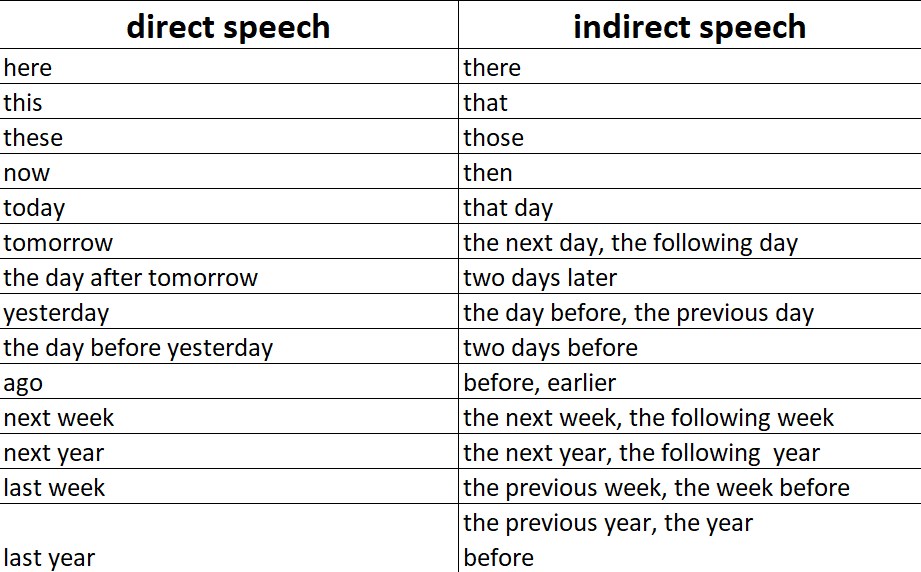
But we don’t always change adverbs this way. We change adverbs only if, when translating from direct speech into indirect speech adverbs cannot express the same meaning as in direct speech.
Take a look at an example:
Mom says, “ Tomorrow we will go to Uncle John’s.” Mom said that the next day we would go to Uncle John’s.
In these examples, we have replaced the adverb tomorrow with the next day . Because we retell Mom’s words on another day. We cannot say tomorrow anymore.
Now look at another example:
Mom says, “We went to visit Uncle John yesterday .”
Now imagine that we are retelling this the next day. We have to say:
Mom said that we went to visit Uncle John the day before yesterday .
If we said “ yesterday “, it would change the meaning of what we want to tell.
If in direct speech in the main sentence the predicate is in Past Simple, then in indirect speech we use the agreement rules.
We put the conjunction “ that ” in front of indirect speech.
Note: We may not use the conjunction that after verbs such as:
He said he found it on the island. He thought he was better than me. He knew he could call you anytime.

Prepositional object
If in direct speech after the verb to say there is a prepositional object, then in order to translate such a sentence into indirect speech, we change the verb to say to tell . In this case, tell is used without the preposition to .
Incorrect : to tell Correct : tell
This means:
She said to me … changes to She told me that …
Note : Remember that in this case we also change the adverbs of place and time and demonstrative pronouns, if they are in direct speech.
Modal verbs
For modals, we use several important rules.
We change modal verbs as well as main verbs when moving from direct to indirect speech.
But we do not change all modal verbs. We leave some verbs in their original form.
Let’s talk about modals in more detail.
Modal verb must
If in direct speech the verb must means an obligation or command, then in the subordinate clause in indirect speech must does NOT change and looks like must .
The teacher says, “You must behave well in class.” The teacher said that we must behave well in class.
If in direct speech the verb must expresses the need, then in the subordinate clause in indirect speech we change the verb must to had to .
Mom says, “You must visit the doctor.” Mom said that I had to visit the doctor.
The past form of Modal verbs in indirect speech
Can and could..
We change the modal verb can in direct speech to could in indirect speech. Could is the past form of the modal verb can .
She says, “I can swim.” She said that she could swim.
May and might.
We change the modal verb may in direct speech to might in indirect speech. Might is the past form of the modal verb may .
John says, “I may propose to Maria.” John said that he might propose to Maria.
Must and had to.
We change the modal verb must in direct speech to had to in indirect speech (if the verb must expresses the need). Had to is the past analog of the modal verb must .

Modal verbs that do not change in indirect speech
The following verbs move from direct to indirect speech in their original form. They don’t change in any way.
- must (if the verb must means an obligation or command)
He says, “I could do this.” He said he could do that.
Let’s take a closer look at these verbs:
The modal verb would in direct speech remains in the form would in indirect speech too.
Mom says, “I would bake a cake.” Mom said she would bake a cake.
If we use the modal verb could in direct speech, then we do not change this verb in any way in indirect speech. Because could is a past form already (It’s the past form of the modal verb can ).
John says, “I could learn to swim” John said he could learn to swim.
The modal verb might does not change its form when we translate this verb from direct to indirect speech. Because the modal might is the past form of the modal may .
He says, “I might ask the same question again”. He said that he might ask the same question again.
We do not change should when switching to indirect speech. Because should is considered the past form of the modal verb shall .
He says, “We should see Mr. Gannon” He said that we should see Mr. Gannon.
We do not change the modal verb OUGHT TO when translating this verb into indirect speech.
She says, “You ought to be angry with John” She said that I ought to be angry with John
Exceptions to the rules
Let’s talk about the important exceptions to the rules of this lesson.
- We can exclude the word that out of affirmative sentences in indirect speech. Because in indirect speech in affirmative sentences, the meaning of the sentence does not change, regardless of whether we use that or not.
He said ( that ) he thought you seemed depressed. He said ( that ) there was no need. He said ( that ) he had many friends.
- If in direct speech we are talking about a specific event that happened at exactly the specified time and did not happen anymore, then we translate the sentence into indirect speech without the agreement.
He says, “Gagarin went to space in 1961.” He said that Gagarin went to space in 1961.
The event that we are talking about in this example happened at exactly the specified time and did not happen anymore.
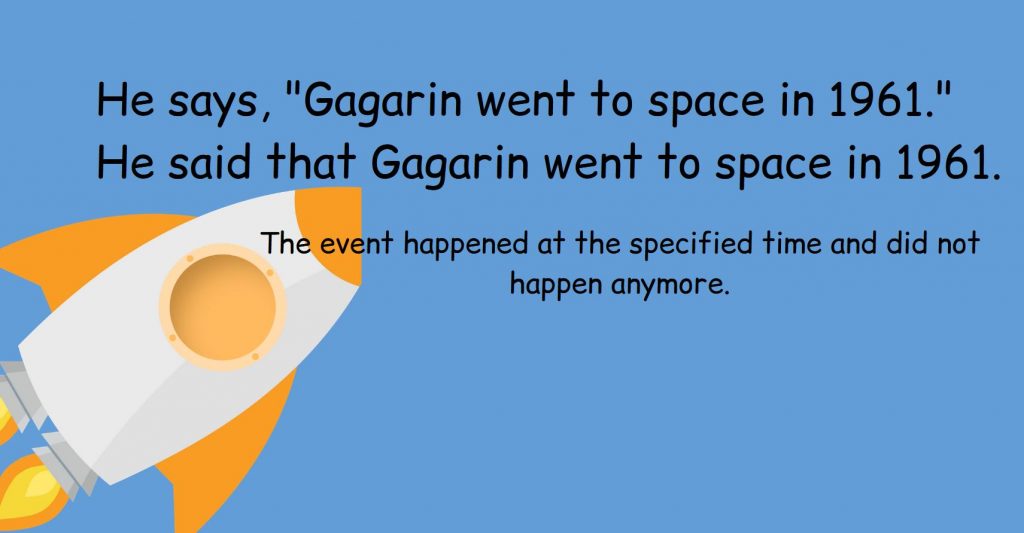
- If in direct speech we use verbs such as:
then when translating into indirect speech, we do not change the form of these verbs. These verbs remain in their form.
She says, “We might find some treasure” She said that we might find some treasure.
He says, “I should do it”. He said that he should do it.
- If indirect speech begins with the verb say or tell which is used in the form:
- Present Simple
- Present Perfect
- Future Simple
then we translate such a sentence into indirect speech without changing the tense to the past:
She says, “I cook deliciously.” She says that she cooks deliciously. He says, “I have a new smartphone.” He says that he has a new smartphone. She will say, “I didn’t know it.” He will say (that) he didn’t know it.
- If in direct speech we are talking about a well-known fact or law of nature, then we do not transfer to the past such a fact or the law of nature when translating from direct speech to indirect.
He says, “After winter comes spring.” He said that after winter comes spring. She says, “Lions don’t hunt camels.” She said that lions don’t hunt camels.
- If in direct speech we use tenses:
- Past Continuous
- Past Perfect
- Past Perfect Continuous
then when translating into indirect speech, we do not change the sentence, we do not translate the sentence into the past.
He says, “I had fixed my car.” He said he had fixed his car. He says, “I was skiing .” He said he was skiing . He says, “I had been all alone for a very long time”. He said that he had been all alone for a very long time.
Interrogative (question) sentences in indirect speech
Look at the following rules and nuances to know how to correctly translate interrogative (question) sentences from direct speech to indirect speech:
- When we translate a general question into indirect speech, we put one of the conjunctions between the main sentence and the question:
He asks, “Do you play dominoes?” He asked if I played dominoes. He asked whether I played dominoes.
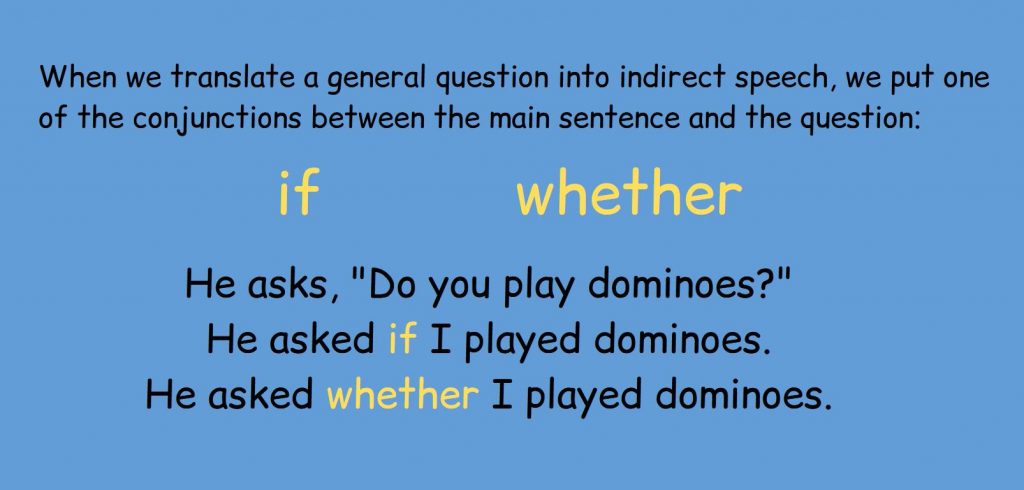
- If we translate an interrogative sentence from direct speech to indirect speech, then we change the interrogative word order to direct word order.
We remove the auxiliary verb that was used in the interrogative sentence. We put the subject before the predicate as it should be for the direct word order.
He asks, “Where are you going?” He asked where I was going.
- If in an indirect sentence we ask a question using the verb say and if there is no indirect object in the main sentence, then we change the verb say to one of these words:
- want to know
She asks, “Where you are?” She wanted to know where you were.
- When translating an interrogative sentence from direct speech into indirect speech, we change all pronouns, verbs, adverbs of place, adverbs of time.
She asks, “What do these letters mean?” She asked what those letters mean.
Special questions in indirect speech
Special questions (or Wh-questions) are questions that begin with an additional, question word.
In indirect speech, such a question should also begin with a question word.
This question word also serves as conjunction. This word attaches the question part to the main sentence.
In the question part, we use direct word order.
At the same time, we comply with all the rules for the Sequence of tenses.
My dad asks, “What do you plan to do with yourself?” My dad asked what I planned to do with myself.
Imperative sentences in indirect speech
When translating imperative sentences from direct to indirect speech, we must take into account several nuances:
- Orders in indirect speech look like this:
He said, “ Go now!” He said to go then. She says, “ Carry my bag” She asked to carry her bag.
We use the verb to say when we translate an ordinary sentence into indirect speech. But in imperative sentences, we change the verb to say to a verb that expresses an order or request:
She says , “Carry my bag” She asked to carry her bag.

- In direct speech in the imperative mood, we often use:
let’s (let us)
let’s encourage the speaker and the person to do something together.
In indirect speech, we change let’s to to suggest . For example:
She says, “ let’s do that!” She suggested to do that.
- In indirect speech, we put a noun after the verb that expresses an order or request. The noun is the one to whom this request or order is addressed. Then we use the infinitive.
She says, “Replace him, John “ She asked John to replace him.
- We can strengthen the request or order in indirect speech if we add verbs such as:
- to recommend
- to urge etc.
She says , “Read this book” She ordered ( advised, recommend ) me to read that book.
- In order to make a negative imperative sentence in direct speech, we need:
not + infinitive
He says, “Don’t cry.” He said to me not to cry.
- In direct speech, we often do not name the person to whom the order or request is addressed. But when translating an imperative sentence from direct speech to indirect speech, we must indicate the one to whom the order or request is addressed.
For this, we use a noun or a pronoun.
She says, “Speak to him!” She asked me to speak to you.
Present and future tense in indirect speech
Most often, we translate the future and the present into the past.
He says, “I have two brothers” He says that he had two brothers She says, “I do this every time” She says that he did that every day. He says, “I write books” He says that he wrote books. She says, “I am reading” She said that she was reading. He says, “I can swim” He said that he could swim. He says, “I will help you” He said that he would help me.
Past tense in indirect speech
When we translate a sentence written in the past into indirect speech, we can leave it unchanged or we can change the past to the Past Perfect.
He says, “I saw this movie” He said that he saw that movie. He said that he had seen that movie.
What if in direct speech the main verb is already in Past Perfect?
In this case, the verb in Past Perfect remains unchanged. The verb in Past Perfect in direct speech remains in Past Perfect in indirect speech too.
He says, “I had bought I new house” He said that he had bought a new house.
I live in Ukraine. Now, this website is the only source of money I have. If you would like to thank me for the articles I wrote, you can click Buy me a coffee . Thank you! ❤❤❤
Recommended reading: Complex Sentence in English.
Related Posts

Prepositions of Place in English Grammar

Prepositions of Reason and Purpose

Direct Word Order in English Sentences

Word Order in Interrogative Sentence

What is Declarative Sentence?

Second Conditional Sentences
Trending now.

Indirect Speech Definition and Examples
- An Introduction to Punctuation
- Ph.D., Rhetoric and English, University of Georgia
- M.A., Modern English and American Literature, University of Leicester
- B.A., English, State University of New York
Indirect speech is a report on what someone else said or wrote without using that person's exact words (which is called direct speech). It's also called indirect discourse or reported speech .
Direct vs. Indirect Speech
In direct speech , a person's exact words are placed in quotation marks and set off with a comma and a reporting clause or signal phrase , such as "said" or "asked." In fiction writing, using direct speech can display the emotion of an important scene in vivid detail through the words themselves as well as the description of how something was said. In nonfiction writing or journalism, direct speech can emphasize a particular point, by using a source's exact words.
Indirect speech is paraphrasing what someone said or wrote. In writing, it functions to move a piece along by boiling down points that an interview source made. Unlike direct speech, indirect speech is not usually placed inside quote marks. However, both are attributed to the speaker because they come directly from a source.
How to Convert
In the first example below, the verb in the present tense in the line of direct speech ( is) may change to the past tense ( was ) in indirect speech, though it doesn't necessarily have to with a present-tense verb. If it makes sense in context to keep it present tense, that's fine.
- Direct speech: "Where is your textbook? " the teacher asked me.
- Indirect speech: The teacher asked me where my textbook was.
- Indirect speech: The teacher asked me where my textbook is.
Keeping the present tense in reported speech can give the impression of immediacy, that it's being reported soon after the direct quote,such as:
- Direct speech: Bill said, "I can't come in today, because I'm sick."
- Indirect speech: Bill said (that) he can't come in today because he's sick.
Future Tense
An action in the future (present continuous tense or future) doesn't have to change verb tense, either, as these examples demonstrate.
- Direct speech: Jerry said, "I'm going to buy a new car."
- Indirect speech: Jerry said (that) he's going to buy a new car.
- Direct speech: Jerry said, "I will buy a new car."
- Indirect speech: Jerry said (that) he will buy a new car.
Indirectly reporting an action in the future can change verb tenses when needed. In this next example, changing the am going to was going implies that she has already left for the mall. However, keeping the tense progressive or continuous implies that the action continues, that she's still at the mall and not back yet.
- Direct speech: She said, "I'm going to the mall."
- Indirect speech: She said (that) she was going to the mall.
- Indirect speech: She said (that) she is going to the mall.
Other Changes
With a past-tense verb in the direct quote, the verb changes to past perfect.
- Direct speech: She said, "I went to the mall."
- Indirect speech: She said (that) she had gone to the mall.
Note the change in first person (I) and second person (your) pronouns and word order in the indirect versions. The person has to change because the one reporting the action is not the one actually doing it. Third person (he or she) in direct speech remains in the third person.
Free Indirect Speech
In free indirect speech, which is commonly used in fiction, the reporting clause (or signal phrase) is omitted. Using the technique is a way to follow a character's point of view—in third-person limited omniscient—and show her thoughts intermingled with narration.
Typically in fiction italics show a character's exact thoughts, and quote marks show dialogue. Free indirect speech makes do without the italics and simply combines the internal thoughts of the character with the narration of the story. Writers who have used this technique include James Joyce, Jane Austen, Virginia Woolf, Henry James, Zora Neale Hurston, and D.H. Lawrence.
- Question Mark Definition and Examples
- Figure of Speech: Definition and Examples
- Indirect Speech in the English Language
- Direct Speech Definition and Examples
- French Grammar: Direct and Indirect Speech
- How to Teach Reported Speech
- Definition and Examples of Direct Quotations
- How to Use Indirect Quotations in Writing for Complete Clarity
- What Is Attribution in Writing?
- Backshift (Sequence-of-Tense Rule in Grammar)
- Indirect Question: Definition and Examples
- Reported Speech
- Using Reported Speech: ESL Lesson Plan
- Constructed Dialogue in Storytelling and Conversation
- The Subjunctive Present in German
- What Are Reporting Verbs in English Grammar?
Choose a region
Direct and indirect speech exercises
There are many occasions in which we need to describe an event or action that happened, and very often that includes repeating what someone said. Such occasions can include a social situation as well as in a work email or presentation. In order to describe what people said there are two different types of speech – direct speech and indirect speech (or reported speech).
Read the article below to find out more about these forms and improve your English storytelling skills.
Do you want to practice your English speaking skills with small classes with native-level teachers? Find out more about Speak+ now
Direct Speech
When we want to describe what someone said, one option is to use direct speech . We use direct speech when we simply repeat what someone says, putting the phrase between speech marks:
- Paul came in and said, “I’m really hungry.”
It is very common to see direct speech used in books or in a newspaper article. For example:
- The local MP said, “We plan to make this city a safer place for everyone.”
As you can see, with direct speech it is common to use the verb ‘to say’ (‘said’ in the past). But you can also find other verbs used to indicate direct speech such as ‘ask’, ‘reply’, and ‘shout’. For example:
- When Mrs Diaz opened the door, I asked, “Have you seen Lee?”
- She replied, “No, I haven’t seen him since lunchtime.”
- The boss was angry and shouted, “Why isn’t he here? He hasn’t finished that report yet!”
Indirect Speech
When we want to report what someone said without speech marks and without necessarily using exactly the same words, we can use indirect speech (also called reported speech). For example:
- Direct speech: “We’re quite cold in here.”
- Indirect speech: They say (that) they’re cold.
When we report what someone says in the present simple, as in the above sentence, we normally don’t change the tense, we simply change the subject. However, when we report things in the past, we usually change the tense by moving it one step back. For example, in the following sentence the present simple becomes the past simple in indirect speech:
- Direct speech: “I have a new car.”
- Indirect speech: He said he had a new car.
All the other tenses follow a similar change in indirect speech. Here is an example for all the main tenses:

The same rule of moving the tenses one step back also applies to modal verbs. For example:

Using ‘say’ or ‘tell’
As an alternative to using ‘say’ we can also use ‘tell’ (‘told’ in the past) in reported speech, but in this case you need to add the object pronoun. For example:
- He told me he was going to call Alan.
- They told her they would arrive a little late.
- You told us you’d already finished the order.
Changing Time Expressions
Sometimes it’s necessary to change the time expressions when you report speech, especially when you are speaking about the past and the time reference no longer applies. For example:
- Direct speech: “I’m seeing my brother tomorrow .”
- Indirect speech: She said she was seeing her brother the following day .
Here are some other examples:
- Direct speech: “I had a headache yesterday .”
- Indirect speech: You said you’d had a headache the day before yesterday .
- Direct speech: “It’s been raining since this afternoon .”
- Indirect speech: He said it’d been raining since that afternoon .
- Direct speech: “I haven’t seen them since last week .”
- Indirect speech: She said she hadn’t seen them since the previous week .
Reporting Questions
When you report a question you need to change the interrogative form into an affirmative sentence, putting the verb tense one step back, as with normal reported speech.
There are two types of questions that we can report – questions that have a yes/no response, and questions that begin with a question word like ‘what’, ‘where’, ‘who’ etc. When we report a yes/no question, we use ‘if’. For example:
- Direct speech: “Do they live here?”
- Indirect speech: You asked me if they lived here.
As you can see, in the reported version of the question, ‘do’ is eliminated because it is no longer a question, and the verb ‘live’ becomes ‘lived’.
For questions starting with question words like ‘what’, ‘where’, ‘when’, ‘who’, etc., we report the question using the question word but change the interrogative form to the affirmative form. For example:
- Direct speech: “Where do they live?”
- Indirect speech: You asked me where they lived.
- Direct speech: “When are you leaving?”
- Indirect speech: He asked us when we were leaving .
- Direct speech: “How will they get here?”
- Indirect speech: She asked me how they would get here.
When we report a question we normally use the verb ‘ask’. As with the verb ‘to tell’, the verb ‘to ask’ is normally followed by an object pronoun, though it is possible to omit it.
Reporting Orders and Requests
When you give someone an order, you use the imperative form, which means using just the verb without a subject. For example:
- “ Call me back later.”
- “ Have a seat.”
- “ Don’t do that!”
To report an order we use ‘tell’ and the infinitive of the verb. For example:
- You told me to call you back later.
- He told me to have a seat.
- She told us not to do that.
When you make a request, you normally use words like ‘can’, ‘could’, or ‘will’. For example:
- “Could you call me back later?”
- “Will you have a seat?”
- “Can you not do that please?”
To report a request, we use the verb ‘to ask’ and the infinitive form of the verb. For example:
- You asked me to call you back later.
- He asked me to have a seat.
- She asked us not to do that.
Now you’ve seen how we use direct and indirect speech , practice using them yourself. An excellent and easy way to see how they are used is by reading a short story in English or a news article online, because stories and articles contain many examples of reported speech.
In English there are various ways to describe rules and obligations. Here is a description of how to express obligation and how and when to use modal verbs.
What are the adverbs of place and how do you use them in a sentence? Read on to find out with this useful article about learning English.
Get in touch
Ready to chat to a member of the Wall Street English team? We’re here to help you.
Reported Speech in English Grammar
Direct speech, changing the tense (backshift), no change of tenses, question sentences, demands/requests, expressions with who/what/how + infinitive, typical changes of time and place.
- Lingolia Plus English
Introduction
In English grammar, we use reported speech to say what another person has said. We can use their exact words with quotation marks , this is known as direct speech , or we can use indirect speech . In indirect speech , we change the tense and pronouns to show that some time has passed. Indirect speech is often introduced by a reporting verb or phrase such as ones below.
Learn the rules for writing indirect speech in English with Lingolia’s simple explanation. In the exercises, you can test your grammar skills.
When turning direct speech into indirect speech, we need to pay attention to the following points:
- changing the pronouns Example: He said, “ I saw a famous TV presenter.” He said (that) he had seen a famous TV presenter.
- changing the information about time and place (see the table at the end of this page) Example: He said, “I saw a famous TV presenter here yesterday .” He said (that) he had seen a famous TV presenter there the day before .
- changing the tense (backshift) Example: He said, “She was eating an ice-cream at the table where you are sitting .” He said (that) she had been eating an ice-cream at the table where I was sitting .
If the introductory clause is in the simple past (e.g. He said ), the tense has to be set back by one degree (see the table). The term for this in English is backshift .
The verbs could, should, would, might, must, needn’t, ought to, used to normally do not change.
If the introductory clause is in the simple present , however (e.g. He says ), then the tense remains unchanged, because the introductory clause already indicates that the statement is being immediately repeated (and not at a later point in time).
In some cases, however, we have to change the verb form.
When turning questions into indirect speech, we have to pay attention to the following points:
- As in a declarative sentence, we have to change the pronouns, the time and place information, and set the tense back ( backshift ).
- Instead of that , we use a question word. If there is no question word, we use whether / if instead. Example: She asked him, “ How often do you work?” → She asked him how often he worked. He asked me, “Do you know any famous people?” → He asked me if/whether I knew any famous people.
- We put the subject before the verb in question sentences. (The subject goes after the auxiliary verb in normal questions.) Example: I asked him, “ Have you met any famous people before?” → I asked him if/whether he had met any famous people before.
- We don’t use the auxiliary verb do for questions in indirect speech. Therefore, we sometimes have to conjugate the main verb (for third person singular or in the simple past ). Example: I asked him, “What do you want to tell me?” → I asked him what he wanted to tell me.
- We put the verb directly after who or what in subject questions. Example: I asked him, “ Who is sitting here?” → I asked him who was sitting there.
We don’t just use indirect questions to report what another person has asked. We also use them to ask questions in a very polite manner.
When turning demands and requests into indirect speech, we only need to change the pronouns and the time and place information. We don’t have to pay attention to the tenses – we simply use an infinitive .
If it is a negative demand, then in indirect speech we use not + infinitive .
To express what someone should or can do in reported speech, we leave out the subject and the modal verb and instead we use the construction who/what/where/how + infinitive.
Say or Tell?
The words say and tell are not interchangeable. say = say something tell = say something to someone
How good is your English?
Find out with Lingolia’s free grammar test
Take the test!
Maybe later

100 Reported Speech Examples: How To Change Direct Speech Into Indirect Speech
Reported speech, also known as indirect speech, is a way of communicating what someone else has said without quoting their exact words. For example, if your friend said, “ I am going to the store ,” in reported speech, you might convey this as, “ My friend said he was going to the store. ” Reported speech is common in both spoken and written language, especially in storytelling, news reporting, and everyday conversations.
Reported speech can be quite challenging for English language learners because in order to change direct speech into reported speech, one must change the perspective and tense of what was said by the original speaker or writer. In this guide, we will explain in detail how to change direct speech into indirect speech and provide lots of examples of reported speech to help you understand. Here are the key aspects of converting direct speech into reported speech.
Reported Speech: Changing Pronouns
Pronouns are usually changed to match the perspective of the person reporting the speech. For example, “I” in direct speech may become “he” or “she” in reported speech, depending on the context. Here are some example sentences:
- Direct : “I am going to the park.” Reported : He said he was going to the park .
- Direct : “You should try the new restaurant.” Reported : She said that I should try the new restaurant.
- Direct : “We will win the game.” Reported : They said that they would win the game.
- Direct : “She loves her new job.” Reported : He said that she loves her new job.
- Direct : “He can’t come to the party.” Reported : She said that he couldn’t come to the party.
- Direct : “It belongs to me.” Reported : He said that it belonged to him .
- Direct : “They are moving to a new city.” Reported : She said that they were moving to a new city.
- Direct : “You are doing a great job.” Reported : He told me that I was doing a great job.
- Direct : “I don’t like this movie.” Reported : She said that she didn’t like that movie.
- Direct : “We have finished our work.” Reported : They said that they had finished their work.
- Direct : “You will need to sign here.” Reported : He said that I would need to sign there.
- Direct : “She can solve the problem.” Reported : He said that she could solve the problem.
- Direct : “He was not at home yesterday.” Reported : She said that he had not been at home the day before.
- Direct : “It is my responsibility.” Reported : He said that it was his responsibility.
- Direct : “We are planning a surprise.” Reported : They said that they were planning a surprise.
Reported Speech: Reporting Verbs
In reported speech, various reporting verbs are used depending on the nature of the statement or the intention behind the communication. These verbs are essential for conveying the original tone, intent, or action of the speaker. Here are some examples demonstrating the use of different reporting verbs in reported speech:
- Direct: “I will help you,” she promised . Reported: She promised that she would help me.
- Direct: “You should study harder,” he advised . Reported: He advised that I should study harder.
- Direct: “I didn’t take your book,” he denied . Reported: He denied taking my book .
- Direct: “Let’s go to the cinema,” she suggested . Reported: She suggested going to the cinema .
- Direct: “I love this song,” he confessed . Reported: He confessed that he loved that song.
- Direct: “I haven’t seen her today,” she claimed . Reported: She claimed that she hadn’t seen her that day.
- Direct: “I will finish the project,” he assured . Reported: He assured me that he would finish the project.
- Direct: “I’m not feeling well,” she complained . Reported: She complained of not feeling well.
- Direct: “This is how you do it,” he explained . Reported: He explained how to do it.
- Direct: “I saw him yesterday,” she stated . Reported: She stated that she had seen him the day before.
- Direct: “Please open the window,” he requested . Reported: He requested that I open the window.
- Direct: “I can win this race,” he boasted . Reported: He boasted that he could win the race.
- Direct: “I’m moving to London,” she announced . Reported: She announced that she was moving to London.
- Direct: “I didn’t understand the instructions,” he admitted . Reported: He admitted that he didn’t understand the instructions.
- Direct: “I’ll call you tonight,” she promised . Reported: She promised to call me that night.
Reported Speech: Tense Shifts
When converting direct speech into reported speech, the verb tense is often shifted back one step in time. This is known as the “backshift” of tenses. It’s essential to adjust the tense to reflect the time elapsed between the original speech and the reporting. Here are some examples to illustrate how different tenses in direct speech are transformed in reported speech:
- Direct: “I am eating.” Reported: He said he was eating.
- Direct: “They will go to the park.” Reported: She mentioned they would go to the park.
- Direct: “We have finished our homework.” Reported: They told me they had finished their homework.
- Direct: “I do my exercises every morning.” Reported: He explained that he did his exercises every morning.
- Direct: “She is going to start a new job.” Reported: He heard she was going to start a new job.
- Direct: “I can solve this problem.” Reported: She said she could solve that problem.
- Direct: “We are visiting Paris next week.” Reported: They said they were visiting Paris the following week.
- Direct: “I will be waiting outside.” Reported: He stated he would be waiting outside.
- Direct: “They have been studying for hours.” Reported: She mentioned they had been studying for hours.
- Direct: “I can’t understand this chapter.” Reported: He complained that he couldn’t understand that chapter.
- Direct: “We were planning a surprise.” Reported: They told me they had been planning a surprise.
- Direct: “She has to complete her assignment.” Reported: He said she had to complete her assignment.
- Direct: “I will have finished the project by Monday.” Reported: She stated she would have finished the project by Monday.
- Direct: “They are going to hold a meeting.” Reported: She heard they were going to hold a meeting.
- Direct: “I must leave.” Reported: He said he had to leave.
Reported Speech: Changing Time and Place References
When converting direct speech into reported speech, references to time and place often need to be adjusted to fit the context of the reported speech. This is because the time and place relative to the speaker may have changed from the original statement to the time of reporting. Here are some examples to illustrate how time and place references change:
- Direct: “I will see you tomorrow .” Reported: He said he would see me the next day .
- Direct: “We went to the park yesterday .” Reported: They said they went to the park the day before .
- Direct: “I have been working here since Monday .” Reported: She mentioned she had been working there since Monday .
- Direct: “Let’s meet here at noon.” Reported: He suggested meeting there at noon.
- Direct: “I bought this last week .” Reported: She said she had bought it the previous week .
- Direct: “I will finish this by tomorrow .” Reported: He stated he would finish it by the next day .
- Direct: “She will move to New York next month .” Reported: He heard she would move to New York the following month .
- Direct: “They were at the festival this morning .” Reported: She said they were at the festival that morning .
- Direct: “I saw him here yesterday.” Reported: She mentioned she saw him there the day before.
- Direct: “We will return in a week .” Reported: They said they would return in a week .
- Direct: “I have an appointment today .” Reported: He said he had an appointment that day .
- Direct: “The event starts next Friday .” Reported: She mentioned the event starts the following Friday .
- Direct: “I lived in Berlin two years ago .” Reported: He stated he had lived in Berlin two years before .
- Direct: “I will call you tonight .” Reported: She said she would call me that night .
- Direct: “I was at the office yesterday .” Reported: He mentioned he was at the office the day before .
Reported Speech: Question Format
When converting questions from direct speech into reported speech, the format changes significantly. Unlike statements, questions require rephrasing into a statement format and often involve the use of introductory verbs like ‘asked’ or ‘inquired’. Here are some examples to demonstrate how questions in direct speech are converted into statements in reported speech:
- Direct: “Are you coming to the party?” Reported: She asked if I was coming to the party.
- Direct: “What time is the meeting?” Reported: He inquired what time the meeting was.
- Direct: “Why did you leave early?” Reported: They wanted to know why I had left early.
- Direct: “Can you help me with this?” Reported: She asked if I could help her with that.
- Direct: “Where did you buy this?” Reported: He wondered where I had bought that.
- Direct: “Who is going to the concert?” Reported: They asked who was going to the concert.
- Direct: “How do you solve this problem?” Reported: She questioned how to solve that problem.
- Direct: “Is this the right way to the station?” Reported: He inquired whether it was the right way to the station.
- Direct: “Do you know her name?” Reported: They asked if I knew her name.
- Direct: “Why are they moving out?” Reported: She wondered why they were moving out.
- Direct: “Have you seen my keys?” Reported: He asked if I had seen his keys.
- Direct: “What were they talking about?” Reported: She wanted to know what they had been talking about.
- Direct: “When will you return?” Reported: He asked when I would return.
- Direct: “Can she drive a manual car?” Reported: They inquired if she could drive a manual car.
- Direct: “How long have you been waiting?” Reported: She asked how long I had been waiting.
Reported Speech: Omitting Quotation Marks
In reported speech, quotation marks are not used, differentiating it from direct speech which requires them to enclose the spoken words. Reported speech summarizes or paraphrases what someone said without the need for exact wording. Here are examples showing how direct speech with quotation marks is transformed into reported speech without them:
- Direct: “I am feeling tired,” she said. Reported: She said she was feeling tired.
- Direct: “We will win the game,” he exclaimed. Reported: He exclaimed that they would win the game.
- Direct: “I don’t like apples,” the boy declared. Reported: The boy declared that he didn’t like apples.
- Direct: “You should visit Paris,” she suggested. Reported: She suggested that I should visit Paris.
- Direct: “I will be late,” he warned. Reported: He warned that he would be late.
- Direct: “I can’t believe you did that,” she expressed in surprise. Reported: She expressed her surprise that I had done that.
- Direct: “I need help with this task,” he admitted. Reported: He admitted that he needed help with the task.
- Direct: “I have never been to Italy,” she confessed. Reported: She confessed that she had never been to Italy.
- Direct: “We saw a movie last night,” they mentioned. Reported: They mentioned that they saw a movie the night before.
- Direct: “I am learning to play the piano,” he revealed. Reported: He revealed that he was learning to play the piano.
- Direct: “You must finish your homework,” she instructed. Reported: She instructed that I must finish my homework.
- Direct: “I will call you tomorrow,” he promised. Reported: He promised that he would call me the next day.
- Direct: “I have finished my assignment,” she announced. Reported: She announced that she had finished her assignment.
- Direct: “I cannot attend the meeting,” he apologized. Reported: He apologized for not being able to attend the meeting.
- Direct: “I don’t remember where I put it,” she confessed. Reported: She confessed that she didn’t remember where she put it.
Reported Speech Quiz
Thanks for reading! I hope you found these reported speech examples useful. Before you go, why not try this Reported Speech Quiz and see if you can change indirect speech into reported speech?

My English Grammar
Ultimate English Grammar, Vocabulary, and Names Database
Changes in Indirect Speech
Welcome to a comprehensive tutorial providing guidance on the proper use, types, and rules of indirect speech in English grammar. Indirect speech, also called reported speech, allows us to share another person’s exact words without using quotes. It is particularly useful in written language. This tutorial aims to brief you about the changes that occur when switching from direct speech to indirect speech. It further explains the necessary rules which must be followed during this transition.
Table of Contents
Understanding Direct and Indirect Speech
Direct speech refers to the exact wording that someone uses when performing an act of speech. However, indirect speech implicitly shares the content of the person’s original words.
Direct Speech: He said, “I am hungry.” Indirect Speech: He said that he was hungry.
Notably, an essential component of indirect speech is the change in verb tense. In the direct speech example, the speaker uses the present tense “am.” In the indirect version, even though the speaker is still hungry, the tense changes to the past “was.”
Changes in Verb Tenses
The verb tense in indirect speech is one step back in time from the tense in the direct speech. Here are the common changes:
- Present Simple becomes Past Simple.
- Present Continuous becomes Past Continuous.
- Present Perfect becomes Past Perfect.
- Present Perfect Continuous becomes Past Perfect Continuous.
- Past Simple becomes Past Perfect.
Direct: He says, “I need help.” Indirect: He said he needed help.
Direct: She is saying, “I am reading a book.” Indirect: She was saying that she was reading a book.
Changes in Time and Place References
Besides the tense, word usage for place and time often changes when converting from direct to indirect speech.
- ‘Now’ changes to ‘then’.
- ‘Today’ changes to ‘that day’.
- ‘Yesterday’ turns into ‘the day before’ or ‘the previous day’.
- ‘Tomorrow’ changes to ‘the next day’ or ‘the following day’.
- ‘Last week/month/year’ switches to ‘the previous week/month/year’.
- ‘Next week/month/year’ changes to ‘the following week/month/year’.
- ‘Here’ turns into ‘there’.
Direct: He said, “I will do it tomorrow.” Indirect: He said that he would do it the next day.
Direct: She said, “I was here.”
Indirect: She said that she was there.
Changes in Modals
Modals also change when transforming direct speech into indirect speech. Here are some common changes:
- ‘Can’ changes to ‘could’.
- ‘May’ changes to ‘might’.
- ‘Will’ changes to ‘would’.
- ‘Shall’ changes to ‘should’.
Direct: She said, “I can play the piano.” Indirect: She said that she could play the piano.
Direct: He said, “I will go shopping.” Indirect: He said that he would go shopping.
Reporting Orders, Requests, and Questions
When reporting orders, requests, and questions, the structure also changes. The following is the structure:
- ‘To’ + infinitive for orders.
- Interrogative word + subject + verb for questions.
- Could/Would + subject + verb for polite requests.
Direct: He said to her, “Close the door.” Indirect: He told her to close the door.
Direct: She asked, “Where is the station?” Indirect: She asked where the station was.
In conclusion, reported speech becomes easier to understand and use effectively with practice. Understanding the transition from direct to indirect speech is vital to expressing yourself accurately and professionally, especially in written English. This guide provides the foundational information for mastering the changes in indirect speech. Practice these rules to become more fluent and confident in your English communication skills.
Related Posts:

Leave a Reply Cancel reply
You must be logged in to post a comment.
Reported speech
Examples from our community, 1,941 results for 'reported speech'.
- Skip to primary navigation
- Skip to main content
- Skip to primary sidebar
English Grammar & Vocabulary
Lessons & Practice Tests
Direct and Indirect Speech – Rules and Examples
13th June 2020 By Edify English Leave a Comment
Any word spoken by a speaker can be written in two different ways. Those two are direct and indirect speech. Direct Speech is when the speaker’s actual words are quoted and these words are put in inverted commas (“…..”) while Indirect Speech is when the speaker’s words are said indirectly with the same meaning without repeating the exact words. For Example, the statement in direct speech She said to me, “I am going to the park” changes into She told me that she was going to the park in indirect speech.

Basic Changes while changing from Direct speech to indirect speech
- The comma ( , )after the reporting verb is removed and the conjunction that is added in the indirect speech.
- If the direct speech contains ‘said to’ , it will be converted into ‘told’ in the indirect speech.
- The quotation marks (Inverted commas) are to be removed in the indirect speech.
- I becomes He/ She
- We becomes they
- You becomes He / She/ They
- Me becomes Him/ he r (Depending on the gender in the direct speech)
- My becomes His/ Her .
- Our becomes their
- Us becomes them
- Your becomes His/ her/ their .
Rules in changing a sentence from Direct and Indirect Speech
- Rule 1: The Verb in the simple present tense in the direct speech changes into the simple past tense in indirect speech
Example: He said to me, “I am happy” becomes He told me that he was happy
(The verb in the direct speech ‘am’ is converted into ‘was’.)
- Rule 2: The verb in the simple past tense becomes past perfect tense in indirect speech.
Example: He said to me, “I was happy” changes into He told me that he had been happy
- Rule 3: A present continuous tense in direct speech becomes past continuous tense in indirect speech.
Example: The peon said, “The professor is teaching in that classroom” changes into The peon said that the professor was teaching in that classroom.
- Rule 4: If the direct speech contains present perfect tense, it changes into the past perfect tense in indirect speech.
Example: She said, “I have passed the test” becomes She said that she had passed the test.
- Rule 5: If the direct speech contains a statement talking about a universal truth or a factual statement, there will be no change of tense in indirect speech.
Example: The teacher said, “The sun rises in the East” becomes The teacher said that the sun rises in the east in indirect speech.
Example: Samuel said, “I know the university’s address.” and the indirect speech for that is Samuel said that he knows the university’s address
Rules for converting Interrogatory sentences
- Rule 6: While converting interrogative sentences, the verb ‘said to’ becomes ‘asked’ and if/ whether will come in the place of ‘that’. The connecting word ‘that’ will not be used in indirect speech. Also, the interrogation mark (?) is not repeated in the indirect speech.
Example: He said to her, “Will you marry me?” changes into He asked her whether she would marry him in the indirect speech.
Rules for Converting Imperative Sentences
- Rule 7: During the conversion of imperative sentences, the verb “said to” is changed into ordered, advised, requested, suggested, proposed, etc. depending on the situation. Also, the connecting word ‘that’ is not used. Instead of that, ‘ to’ is used before the reporting verb.
Example: My father said to me, “prepare well for your examination” . It can be converted to My father advised me to prepare well for my examination.
Rules for Converting Exclamatory Sentences
- Rule 8: For exclamatory sentences, the verb is converted into: exclaimed with joy or sorrow or with surprise, wished, prayed, applauded,/ etc. The exclamatory words and the exclamation are not mentioned anymore in the indirect speech. For example,
Example: The coach said, “Hurrah! we won the match!” is changed as The coach exclaimed with joy that we had won the match.
These are the changes in helping verbs while changing from Direct and Indirect Speech
Note: There is no change in the helping verbs “would, should, could, might, had” in the direct speech and they remain the s ame in indirect speech as well.
Changes in Time and Place
Cha nges in pronoun s
The changes in pronouns in indirect speech depends on the subject and the object of the reporting verb.
- Rule 1: The first person of reported speech changes based on the subject of the reporting verb.
Example: She said, “I watched a movie” can be converted into She said that she had watched a movie . Hence, the first person in the direct speech “I” has become “she” based on the subject.
Had there been “he” instead of “she”, the first person in reported speech changes accordingly into “he”.
- Rule 2: The second person in reported speech changes based on the object of the reporting verb.
Example: She said to me, “You watched a movie” can be converted into She told me that I had watched a movie.
- Rule 3 : The third person in the reported speech remains unchanged.
Example: I said to her, “He will play Chess” can be converted into I told her that he would play Chess.
Stay tuned for more examples of direct and indirect speech.
For an extensive material on tenses, Click here
Follow us on Facebook
Share this:
Subscribe to blog via email.
Enter your email address to subscribe to this blog and receive notifications of new posts by email.
Email Address
Reader Interactions
Leave a reply cancel reply.
Easy Insightful Literature Notes
Transformation of Sentence: Direct & Indirect Speech
A direct speech can be transformed into an indirect speech and vice versa using a suitable reporting verb and a linker depending on the sentence. Let’s have an example first.
- Tina said to me, “Are you busy now?” [direct speech]
- Tina asked me whether I was busy then. [indirect speech]
Direct Speech
Indirect Speech
- Look, if the reporting verb in direct speech (said) is in past tense, the reporting verb in indirect speech (asked) would also be in past tense. ‘Whether’ is the linker added here as it is a ‘yes-no’ type question (Refer to list 1 below).
- ‘Are’ changes to ‘was’. As the reporting verb was in past tense, the verb in the reported speech will also be in past. (Refer to list 2 below)
- ‘Now’ has become ‘then’. Time and place expressions change if the reporting verb is in past tense. (Refer to list 3 below)
- The question mark (?) has changed to a full stop(.).
- Another important thing, the format of question (v + s + o) has changed to the format of a statement (s + v + o). In indirect speech the pattern always comes to subject + verb + object.
List of Reporting verbs and linkers (list 1)
Verbs of Reported speech (if the reporting verb is in past tense) (list 2) Direct speech → Indirect speech Am / is / are → was / were Was / were → had been Has / have → had Had → had had Shall / will → would Can → could May → might Must, should → must, should Verb1 → verb2 Verb2 → had + verb3
Change of time and place expressions in past tense (list 3) now → then ago → before today → that day yesterday → the previous day tomorrow → the next day last night → the previous night here → there this → that these → those
Narration change of Assertive sentence
- Robin said, “I went to Delhi yesterday.” – Robin said that he had gone to Delhi the previous day .
- She said to her husband, “I want to go with you.” – She told her husband that she wanted to go with him.
Narration change of Interrogative sentence
- He said to me, “Do you know English?” – He asked me whether I knew English.
- She said to me, “Did you go there?” – She wanted to know whether I had gone there.
- I said to him, “What are you doing?” – I asked him what he was doing.
- Rahul said to his mother, “How do you do all these things together?” – Rahul asked his mother how she did all those things together.
Narration change of Imperative sentence
- He said to me, “Go there right now.” – He ordered me to go there right then.
- My teacher said to me, “Obey your parents.” – My teacher asked me to obey my parents.
- She said to me, “Please don’t go there.” – She requested me not to go there.
- He said to her, “Let’s go home.” – He suggested her that they should go home.
- His mother said, “Let him eat whatever he likes.” – His mother suggested that he might be allowed to eat whatever he liked.
Narration change of Optative sentence
- He said to the boy, “May god bless you.” – He prayed that God might bless the boy.
- The girl said, “Had I the wings of a dove.” – The girl wished that she had the wings of a dove.
Narration change of Exclamatory sentence
- “How happy we are here!” said the children. – The children exclaimed in joy that they were very happy there.
- The children said, “How happy we were there!” – The children exclaimed in sorrow that they had been very happy there.
- He said to me, “Good bye!” – He bade me good bye.
- She said to me, “Good evening!”—She wished me good evening.
Narration change of Vocatives
- Teacher said, “ Robin , stand up.” – Teacher asked Robin to stand up.
- The Bishop said to the convict, “Always remember, my son , that the poor body is the temple of the living God.” – The Bishop addressed the convict as his son and advised him to always remember that the poor body is the temple of the living God.
Narration change of question tag
- He said to me, “You went to Kolkata, didn’t you?” – He asked me whether I had gone to Kolkata and assumed that I had.
- I said to him, “Tina didn’t tell a lie, did she?” – I asked him if Tina had told a lie and assumed that she had not.
We serve cookies on this site to offer, protect and improve our services. KNOW MORE OK

Reported speech: direct speech
Direct speech is a representation of the actual words someone said. A direct speech report usually has a reporting verb in the past simple. The most common reporting verb is said . The reporting clause may come first or second.
The reporting clause may sometimes come in the middle of the reported clause, especially in literary styles:
“No,” she said , “I’ve never seen it before.”
‘Was it,’ he asked , ‘the first time you had spoken to Mrs Dalton?’
We can use adverbs with the reporting verb to describe the way someone said something. This is more common when the reporting clause comes second:
“I will not accept it!” he said angrily .
‘Can I speak to the doctor?’ she asked rather nervously .
Reported speech: punctuation
Reported speech: reporting and reported clauses
Direct speech: inversion of subject and reporting verb
In narratives, especially novels and short stories, when the reporting clause comes second, we often invert the subject (s) and reporting verb (v):
“Things have always been the same in this village,” [V] said [S] the old man .
‘Hold on! I’m coming!’ [V] cried [S] Maurice .
Direct speech: present simple and continuous reporting verbs
Informal narratives.
In informal conversation, we sometimes use the present simple in the reporting clause. This makes the direct speech more vivid and dramatic:
So then this guy says , “I’ve got something for you. Come over here.” And he picked up a box and he says , “Open that.”
We can make the direct speech even more vivid and dramatic by using the present continuous. This is very informal:
And he’s looking at me and he ’s asking , “Who are you?” and I said, “I’m your nephew” and he ’s mumbling , “I don’t know you. I’ve never seen you before in my life.”
In very informal conversation, people sometimes use says as a reporting verb for all persons ( I, you, she, he, we, they ):
She says , ‘What’s going on here?’ and I says , ‘Nothing. There’s nothing happening – everything’s okay.’
Many speakers consider the above examples to be incorrect. This applies especially to the use of says with all persons.
After backlash, Trump pulls social media post with reference to 'unified Reich'
- Medium Text

Sign up here.
Reporting by Nathan Layne in Wilton, Connecticut; Additional reporting by Steve Holland, Jarrett Renshaw and Andy Sullivan; Editing by Ross Colvin, Daniel Wallis, Jonathan Oatis and Christopher Cushing
Our Standards: The Thomson Reuters Trust Principles. New Tab , opens new tab

World Chevron

More than 300 buried in Papua New Guinea landslide, local media report
The landslide has blocked highway access, making helicopters the only way to reach the area, the ABC reported.

Harrison Butker’s commencement speech: Wives should stay at home. His mom’s a medical physicist

- Show more sharing options
- Copy Link URL Copied!
Harrison Butker is a three-time Super Bowl champion and one of the most accurate field-goal kickers in NFL history.
As such, the Kansas City Chiefs kicker was given a platform to express his views as the commencement speaker at Benedictine College .
The devout Christian used the opportunity to give some radical thoughts and controversial opinions during a 20-minute speech delivered at the ceremony honoring the 485 students graduating from the Catholic private liberal arts school in Atchison, Kan., on Saturday.
Butker took shots at gender roles, abortion, President Biden and Pride month during his Benedictine address. Now the NFL appears to be distancing itself from the 28-year-old.
“Harrison Butker gave a speech in his personal capacity,” Jonathan Beane, NFL senior vice president and chief diversity and inclusion officer, said in a statement emailed to The Times. “His views are not those of the NFL as an organization. The NFL is steadfast in our commitment to inclusion, which only makes our league stronger.”

Entertainment & Arts
What’s the deal with Jerry Seinfeld? His Duke University address sparks student walkout
Duke University enlisted Jerry Seinfeld to deliver its 2024 commencement speech, but a group of pro-Palestinian student protesters refused to stay for his punchline.
May 13, 2024
At Benedictine, Butker told the male graduates to “be unapologetic in your masculinity” and congratulated the female graduates on their “amazing accomplishment.” He went on to tell the women that he “would venture to guess that the majority of you are most excited about your marriage and the children you will bring into this world.”
Butker then told those women that “my beautiful wife, Isabelle, would be the first to say her life truly started when she began living her vocation as a wife and as a mother. I’m on this stage today and able to be the man I am because I have a wife who leans into her vocation.”
Butker — whose mother, Elizabeth Keller Butker, is a medical physicist at Emory University’s Winship Cancer Institute in Atlanta, where she’s worked since 1988 — then started getting choked up.
“I’m beyond blessed with the many talents God has given me,” Butker said, “but it cannot be overstated that all my success is made possible because a girl I met in band class back in middle school would convert to the faith, become my wife and embrace one of the most important titles of all: homemaker.”
That statement was met with 18 seconds of enthusiastic cheers and applause. Butker continued praising his wife and her role in their family.
“She’s the primary educator to our children. She’s the one who ensures I never let football or my business become a distraction from that of a husband and a father. She is the person that knows me best at my core and it is through our marriage that, Lord willing, we both will attain salvation.”
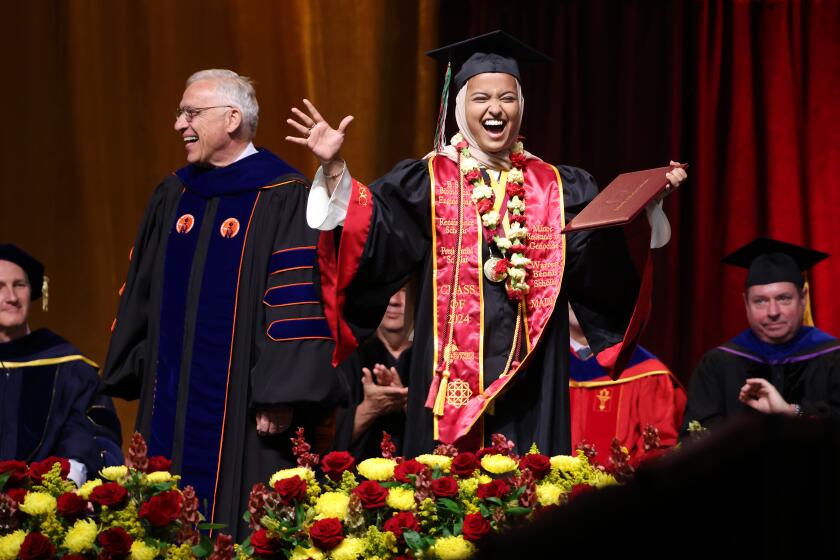
Silenced USC valedictorian walked the stage and the crowd reaction was anything but silent
Diplomas will be handed out Friday during individual school events for graduating seniors at USC.
May 10, 2024
During his opening remarks, Butker stated that “things like abortion , in vitro fertilization , surrogacy , euthanasia, as well as a growing support for the degenerate cultural values and media, all stem from the pervasiveness of disorder.”
He also said that Biden “has been so vocal in his support for the murder of innocent babies that I’m sure to many people it appears you can be both Catholic and pro-choice.”
At one point, Butker mentioned the word “pride” — then clarified that he wasn’t talking about “the deadly sins sort of Pride that has an entire month dedicated to it, but the true God-centered pride that is cooperating with the Holy Ghost to glorify Him.”
The comment, a jab at the LGBTQ+ community that celebrates Pride month every June, received a few chuckles from the audience.
When Butker finished his address, the crowd rose for an ovation. Susannah Leisegang , a former Benedictine track and field athlete who graduated Saturday with a degree in graphic design, said she was among the handful of people who did not stand.
“Some of us did boo — me and my roommate definitely did,” Leisegang said in a video she posted on TikTok . “There was a standing ovation from everyone in the room, except from me, my roommate and about 10 to 15 other women. You also have to keep in mind this was at a Catholic and conservative college, so a lot of the men were like, ‘F— yeah!’ They were excited. But it was horrible. Most of the women were looking back and forth at each other like, ‘What the f— is going on?’”

Supreme Court to pregnant women: Good luck with that
Forget the ‘split court’ garbage. This Supreme Court is not going to protect even emergency abortions. Here’s what you need to know.
April 25, 2024
Leisegang pointed out that she is 21 and has a job lined up in her field.
“Getting married and having kids is not my ideal situation right now,” she said. “So, yeah, it was definitely horrible and it definitely made graduation feel a little less special, knowing I had to sit through that and get told I’m nothing but a homemaker.”
Other members of the graduating class who participated in the ceremony have shared a variety of opinions on Butker’s speech. Elle Wilbers, 22, a future medical school student, told the Associated Press she thought Butker’s reference to the LGBTQ+ community was “horrible.”
“We should have compassion for the people who have been told all their life that the person they love is like, it’s not OK to love that person,” she said.
Kassidy Neuner, 22, who plans to teach for a year before going to law school, told the AP that being a stay-at-home parent is “a wonderful decision” but “it’s also not for everybody.”
“I think that he should have addressed more that it’s not always an option,” she said. “And, if it is your option in life, that’s amazing for you. But there’s also the option to be a mother and a career woman.”

Company Town
Hollywood’s stunt-driving industry is dominated by men. These women are fighting for change
Olivia Summers and Dee Bryant are building a team of all-women stunt drivers to make the stunt-driving industry more inclusive.
April 10, 2024
ValerieAnne Volpe, 20, who graduated with an art degree, told the AP she thought Butker said things that “people are scared to say.”
“You can just hear that he loves his wife,” Volpe said. “You can hear that he loves his family,” she said.
Butker has not commented publicly since the address. His previous social media posts are being used by people leaving comments both blasting and supporting his remarks. Heavy.com reports that all images of Isabelle Butker have been removed from her husband’s X and Instagram feeds in recent days.
Benedictine has not publicly addressed Butker’s controversial statements and did not immediately respond to multiple messages from The Times. The college’s social media feeds have been flooded with angry comments regarding Butker’s speech, and the comment section for the YouTube video of it has been disabled.
An article on Benedictine’s website about the commencement ceremony had initially referred to Butker’s speech as “inspiring.” The uncredited piece includes a reworked version of Butker’s “homemaker” quote that does not include that word, with no indication that the quote had been altered.

California high school football team refuses to play against girls, even after settling Title IX lawsuit
Despite settling a Title IX lawsuit, Santa Maria Valley Christian Academy again didn’t allow its high school football team to play against an opponent with female players.
Oct. 5, 2023
The Chiefs did not respond to a request for comment from The Times. Tavia Hunt, wife of Chiefs owner Clark Hunt , appeared to express her support for Butker in a lengthy Instagram post Thursday.
“Countless highly educated women devote their lives to nurturing and guiding their children,” she wrote. “Someone disagreeing with you doesn’t make them hateful; it simply means they have a different opinion. Let’s celebrate families, motherhood and fatherhood.”
Gracie Hunt, 25, one of Clark and Tavia Hunt’s three children was asked about Butker’s speech Friday on “ Fox & Friends .”
“I can only speak from my own experience, which is I had the most incredible mom who had the ability to stay home and be with us as kids growing up,” Gracie Hunt said. “And I understand that there are many women out there who can’t make that decision but for me in my life, I know it was really formative in shaping me and my siblings to be who we are.”
Asked if she understood what Butker was talking about, Hunt said, “For sure, and I really respect Harrison and his Christian faith and what he’s accomplished on and off the field.”
A change.org petition calling for the team to release the kicker because of his comments has received more than 185,000 signatures. Eight petitions supporting Butker appear on the site as well. One has more than 11,000 signatures while the rest have fewer than 800 each.
The Chargers poked fun at Butker on Wednesday in their schedule-release video, which is modeled after “The Sims” video game. In the video, Butker’s likeness is shown baking a pie, scrubbing a kitchen counter and arranging flowers.
should we REALLY make our schedule release video in the sims? yes yes yesyes yesyes yes yes yes yes yes yes yes yes yes yesyes yes yes yes yesye yes yes yes yes yesyes pic.twitter.com/MXzfAPyhe8 — Los Angeles Chargers (@chargers) May 16, 2024
The official X account for Kansas City also appeared to attempt putting a humorous spin on the matter, posting a “reminder” that Butker lives in a different city Wednesday night before deleting it and posting an apology .
Earlier in the week on X, Kansas City Mayor Quinton Lucas appeared to defend Butker’s right to express his views .
Grown folks have opinions, even if they play sports. I disagree with many, but I recognize our right to different views. Nobody should have to stick to anything. Varied and shall I say—diverse—viewpoints help the world go round. — Mayor Q (@QuintonLucasKC) May 14, 2024
I think he holds a minority viewpoint, even in this state and the bordering one. I also believe more athletes, if freer to speak, would stand up for the voices of many marginalized communities. I hate “stick to sports” when used to muzzle Black athletes. I’m with consistency. — Mayor Q (@QuintonLucasKC) May 14, 2024
Last year, Butker gave the commencement address at his alma mater, Georgia Tech, advising the graduates to “ get married and start a family .”

The fight to move the Catholic Church in America to the right — and the little-known O.C. lawyer behind it
As Pope Francis nudges the Roman Catholic Church to the left globally, layman Tim Busch of Irvine is pushing American Catholicism to the right.
Dec. 18, 2023
More to Read

Travis Kelce won’t judge Harrison Butker, even though kicker referenced Taylor Swift in speech
May 24, 2024

Patrick Mahomes calls Harrison Butker ‘a great person.’ Andy Reid says kicker ‘has his opinions’
May 22, 2024

Granderson: A football player said something stupid about women. Let it go
May 17, 2024
Get our high school sports newsletter
Prep Rally is devoted to the SoCal high school sports experience, bringing you scores, stories and a behind-the-scenes look at what makes prep sports so popular.
You may occasionally receive promotional content from the Los Angeles Times.

Chuck Schilken is a sports reporter on the Fast Break team. He spent more than 18 years with the Los Angeles Times’ Sports Department in a variety of roles. Before joining The Times, he worked for more than a decade as a sports reporter and editor at newspapers in Virginia and Maryland.
More From the Los Angeles Times
A slingshot-wielding vandal shattered glass in azusa for years. an 81-year-old suspect has been arrested.

Commentary: Here’s how to actually show appreciation for teachers
May 25, 2024

Early signs of rising COVID in California as new FLiRT subvariants dominate

South Lake Tahoe split over proposal to tax property owners who leave homes vacant
Trump email falsely says Biden was ‘locked & loaded’ to ‘take me out’ in Mar-a-Lago search
A former president falsely accusing his successor and rival of posing a threat to his life is without precedent in modern U.S. history.

Donald Trump on Tuesday falsely claimed in a campaign fundraising email that President Biden was “locked & loaded ready to take me out” during a 2022 search of his Mar-a-Lago estate for classified documents, an extraordinary distortion of a standard FBI policy on the use of deadly force during such operations.
Trump appeared to be referring to a law enforcement document, released Tuesday in court filings in the classified documents case, that describes the FBI’s plans for a court-authorized search on Aug. 8, 2022, at Mar-a-Lago, his Florida residence and private club. FBI agents recovered classified material from Trump’s time in the White House — which the former president is now charged with illegally retaining. One page in the document includes a “policy statement” on the use of deadly force, which says officers may resort to lethal force only when the subject of such force poses an “imminent danger of death or serious physical injury” to an officer or another person.
Trump, the presumptive GOP nominee for president, and some of his allies suggested Tuesday that this was evidence that Biden’s Justice Department was prepared to fatally shoot him. In fact, Trump was not at his Florida property the day of the search. FBI agents specifically sought to avoid a confrontation with Trump, choosing a day when Trump would not be at the property and giving the Secret Service a heads-up, The Washington Post previously reported.
A former president falsely accusing his successor and rival of posing a threat to his life is without precedent in modern U.S. history. The comments marked a sharp escalation of Trump’s baseless attacks on Biden , as the former president faces 88 criminal charges across four indictments in federal and state courts. Trump has frequently accused Biden of weaponizing the legal system against him in coordination with the Justice Department and local prosecutors. There is no evidence of such coordination.
A Tuesday evening fundraising email from the Trump campaign that was signed in the candidate’s name arrived with the subject line, “They were authorized to shoot me!” and said of the Biden administration, “You know they’re just itching to do the unthinkable … Joe Biden was locked & loaded ready to take me out & put my family in danger.”
Trump also wrote Tuesday on his social media site, Truth Social, that “Joe Biden’s DOJ, in their Illegal and UnConstitutional Raid of Mar-a-Lago, AUTHORIZED THE FBI TO USE DEADLY (LETHAL) FORCE.”
The FBI said in a statement Tuesday that it “followed standard protocol in this search as we do for all search warrants, which includes a standard policy statement limiting the use of deadly force.”
“No one ordered additional steps to be taken and there was no departure from the norm in this matter,” the agency said.
FBI agents got approval from a federal magistrate judge in Florida to search Mar-a-Lago after months of efforts to get Trump to hand over the documents at issue. Agents also arrived in deliberately casual outfits to lower their profile — khakis and polo shirts — to comb the area and left with more than 100 classified records, some of which were top secret.
In response to a question about the differences between the policy in the law enforcement document and Trump’s claims, his campaign spokeswoman Karoline Leavitt accused The Washington Post of waging a “sickening attempt to run cover for Joe Biden.”
“The good news is, Americans don’t buy the pro-Democrat, Election Interfering pro-Biden propaganda the Washington Post is constantly selling,” she wrote in an email.
The Biden campaign did not immediately respond to a request for comment. Some of Trump’s allies echoed the former president’s claims on social media.
Rep. Marjorie Taylor Greene (R-Ga.), a staunch Trump ally, went even further than Trump on social media, writing on X that “The Biden DOJ and FBI were planning to assassinate Pres Trump and gave the green light.”
Throughout his campaign, Trump has used the charges against him to rally his political base and raise millions of dollars. He has pleaded not guilty to the charges.
Trump is currently on trial in New York on allegations of falsifying business records to cover up hush money to a porn actress and awaits trial in the other three cases.
Trump’s Tuesday comments add to a long history of false and incendiary claims against his political opponents, which Democrats and some Republicans have denounced, and has alarmed historians who have studied political rhetoric. Some of his supporters, including Republican members of Congress, conservative media personalities and others have often repeated or amplified his claims.
It is not clear if Trump will stand trial before the election on the charges of mishandling classified documents. Prosecutors say Trump improperly kept top-secret documents from his presidency and then obstructed the government’s attempts to retrieve them.
Perry Stein, Josh Dawsey and Aaron Schaffer contributed to this report.


IMAGES
VIDEO
COMMENTS
Indirect or Reported speech (непрямая или косвенная речь) - это пересказ чьей-то речи или своих собственных слов. Косвенная речь передается придаточным предложением с помощью союзов или без них. В этом ...
🟢 Бесплатные упражнения по английскому языку по теме: Reported speech (indirect speech), tag questions and negation / Косвенная речь, разделительные вопросы и отрицание. Теория, написанная лучшими методистами онлайн школы Skyeng.
Well, formally Russian does not use sequence of tenses. Indirect speech just uses the same tense that is used in a direct speech. So, Бабушка сказала: "Я хочу (present, first person) купить игрушку внуку." "Бабушка сказала, что она хочет (present, third person) купить игрушку внуку."
The following rules are used to change an optative sentence from direct speech to indirect speech. (a) Reporting verbs changed to ' wish ', ' pray', and ' bless ' in Indirect Speech. (b) Linker, ' that ' is placed before Reported speech in Indirect Narration. Example: Direct: The monk said to me, " May God bless you.".
Direct and Indirect Speech . Russian Grammar Exercises. By Dr. Sergei Fadeev. Direct and Indirect Speech ...
Reported speech: indirect speech - English Grammar Today - a reference to written and spoken English grammar and usage - Cambridge Dictionary
Indirect speech: Mary said that she loved ice cream. Step 3: Change the Tense of the Verb. When you use indirect speech, you need to change the tense of the verb in the reported speech to match the tense of the reporting verb. For example: Direct speech: "I am going to the store," said John. Indirect speech: John said that he was going to ...
Indirect or Reported speech (непряма мова) - це певний переказ чиєїсь мови або ж своїх власних слів. Непряма мова передається підрядним реченням за допомогою сполучників або ж без них. В такому випадку ...
In linguistics, speech or indirect discourse is a grammatical mechanism for reporting the content of another utterance without directly quoting it. For example, the English sentence Jill said she was coming is indirect discourse while Jill said "I'm coming" would be direct discourse.In fiction, the "utterance" might amount to an unvoiced thought that passes through a stream of consciousness ...
These four categories are illustrated in Table 10.1 using the speech acts of promising and requesting. Generally speaking, speakers perform an indirect speech act by stating or asking about one of the Felicity Conditions (apart from the essential condition). The examples in (7) show some sentences that could be used as indirect requests for tea.
In direct speech, the speaker most often speaks in the first person. That is, the speaker speaks from his person. John will not talk about himself: John is a good boy. John will say it on his behalf: I am a good boy. But when we retell the words of John (indirect speech), we cannot speak on his behalf.
In nonfiction writing or journalism, direct speech can emphasize a particular point, by using a source's exact words. Indirect speech is paraphrasing what someone said or wrote. In writing, it functions to move a piece along by boiling down points that an interview source made. Unlike direct speech, indirect speech is not usually placed inside ...
What is indirect speech or reported speech? When we tell people what another person said or thought, we often use reported speech or indirect speech. To do that, we need to change verb tenses (present, past, etc.) and pronouns (I, you, my, your, etc.) if the time and speaker are different.For example, present tenses become past, I becomes he or she, and my becomes his or her, etc.
Direct speech: "I'm seeing my brother tomorrow.". Indirect speech: She said she was seeing her brother the following day. Here are some other examples: Direct speech: "I had a headache yesterday.". Indirect speech: You said you'd had a headache the day before yesterday. Direct speech: "It's been raining since this afternoon.".
Introduction. In English grammar, we use reported speech to say what another person has said. We can use their exact words with quotation marks, this is known as direct speech, or we can use indirect speech. In indirect speech, we change the tense and pronouns to show that some time has passed. Indirect speech is often introduced by a reporting ...
Direct: "I will help you," she promised. Reported: She promised that she would help me. Direct: "You should study harder," he advised. Reported: He advised that I should study harder. Direct: "I didn't take your book," he denied. Reported: He denied taking my book. Direct: "Let's go to the cinema," she suggested.
Welcome to a comprehensive tutorial providing guidance on the proper use, types, and rules of indirect speech in English grammar. Indirect speech, also called reported speech, allows us to share another person's exact words without using quotes. It is particularly useful in written language. This tutorial aims to brief you about the changes ...
Reported Speech 1 Speaking cards. by Marikulish. 0-100 English Grammar Английский Reported speech. Reported Questions Laser B2 u8 Match up. by Galinabekker001. 12-15 Laser B2 Laser B2 u8 reported speech. Reported speech 2 Speaking cards. by Marikulish. 0-100 English Grammar Английский Questions Reported speech.
Cha nges in pronoun s. The changes in pronouns in indirect speech depends on the subject and the object of the reporting verb. Rule 1: The first person of reported speech changes based on the subject of the reporting verb. Example: She said, "I watched a movie" can be converted into She said that she had watched a movie.Hence, the first person in the direct speech "I" has become "she ...
A direct speech can be transformed into an indirect speech and vice versa using a suitable reporting verb and a linker depending on the sentence. Let's have an example first. Tina said to me, "Are you busy now?" [direct speech] Tina asked me whether I was busy then. [indirect speech] Direct Speech. Speaker. Reporting verb. Direct speech ...
Note: That is often implied in indirect discourse. It is not mandatory to use it, so it is indicated in brackets in this lesson. Introductory verbs To relate someone's words to both direct and indirect speech, you need an introductory verb. The two most frequent are tell and say, but there are many other possible ones like: ask reply warn
US media reported that the version appearing on Truth Social was first posted on X/Twitter by a user called "Ramble Rants", who regularly reposts videos from a pro-Trump group called the Dilley ...
Trump is set to deliver a speech Saturday at the 2024 Libertarian National Convention, and if Friday night's program is any indication, he could be facing a hostile crowd.
Reported speech: direct speech — English Grammar Today — справочник по письменной и устной английской грамматике и использованию — Cambridge Dictionary
A top Russian diplomat said on Friday the United States had long since entered into a state of indirect war with Moscow and was playing with fire over Ukraine by behaving in such a way that the ...
Indirect or Reported speech (непрямая или косвенная речь) - это пересказ чьей-то речи или своих собственных слов. Косвенная речь передается придаточным предложением с помощью союзов или без них. В этом ...
Donald Trump deleted a video posted to his Truth Social account that included reference to a "unified Reich" after President Joe Biden's campaign and others criticized the use of language often ...
Harrison Butker is a three-time Super Bowl champion and one of the most accurate field-goal kickers in NFL history. As such, the Kansas City Chiefs kicker was given a platform to express his views ...
Donald Trump on Tuesday falsely claimed in a campaign fundraising email that President Biden was "locked & loaded ready to take me out" during a 2022 search of his Mar-a-Lago estate for ...
House GOP Conference Chair Elise Stefanik delivered remarks at the Israeli Knesset Sunday, saying victory for Israel in the war against Hamas starts with "wiping" those responsible for the ...